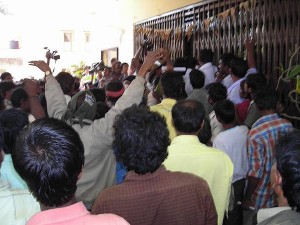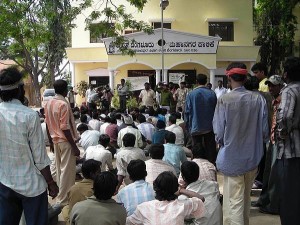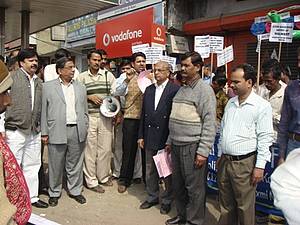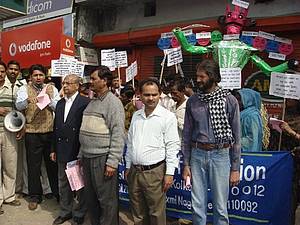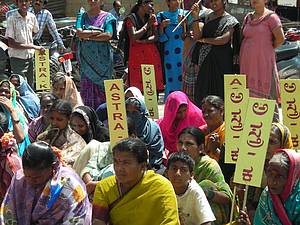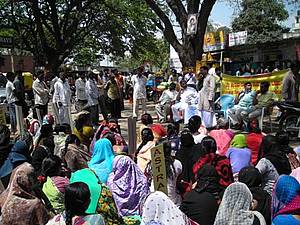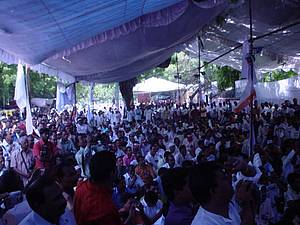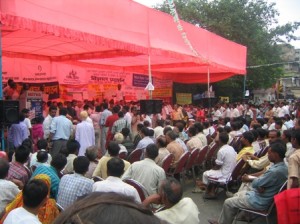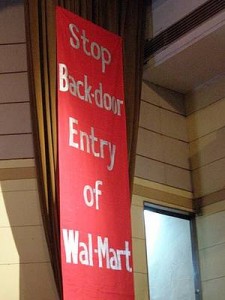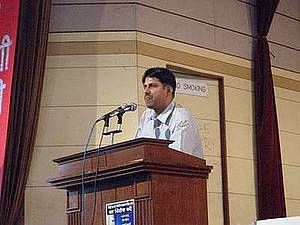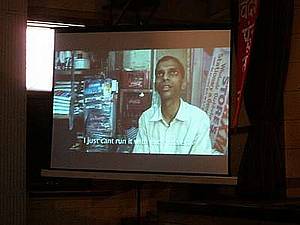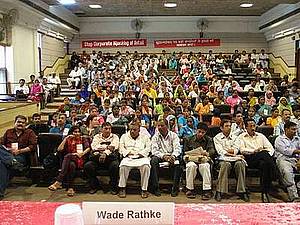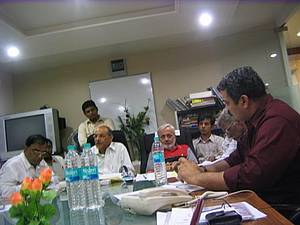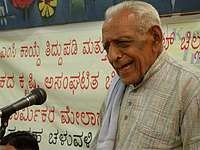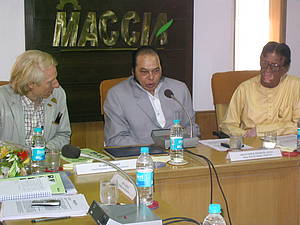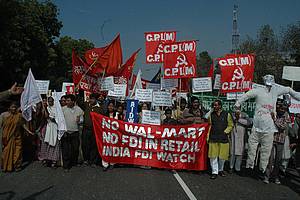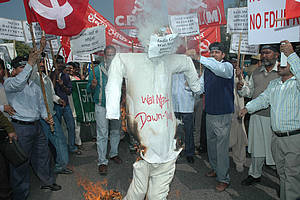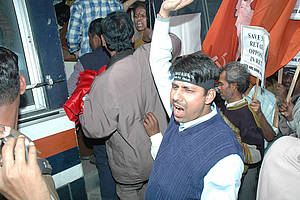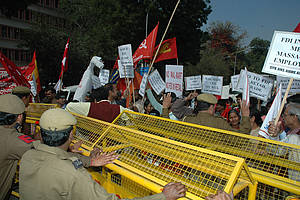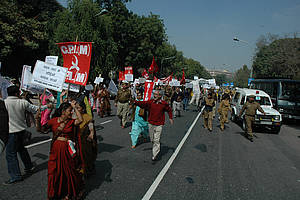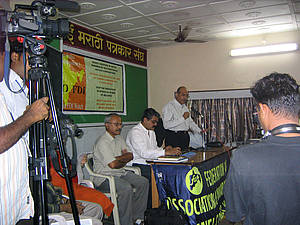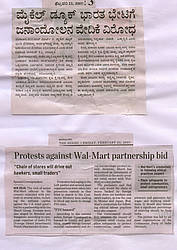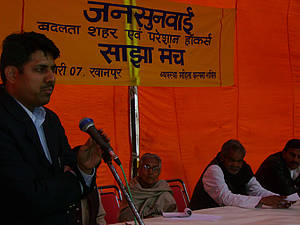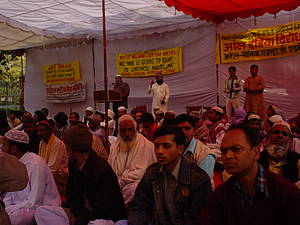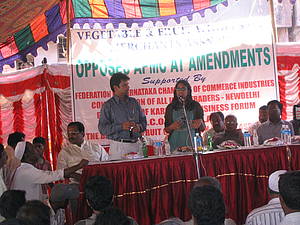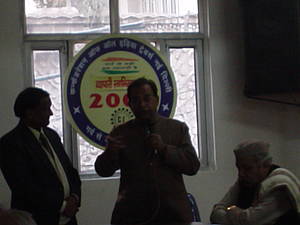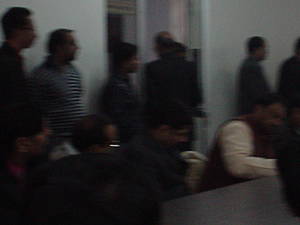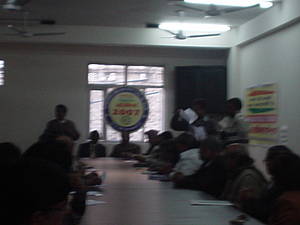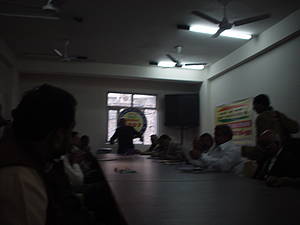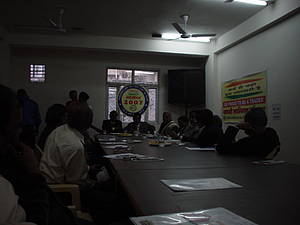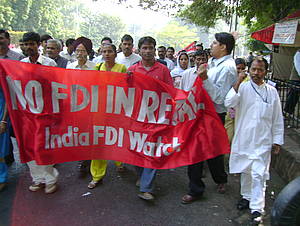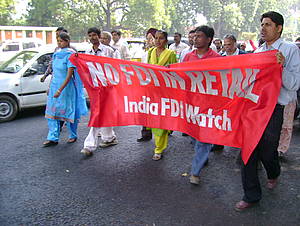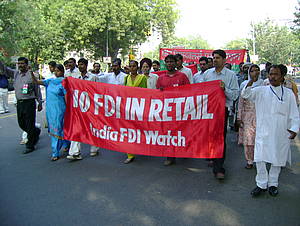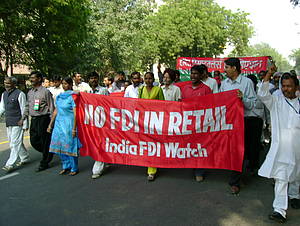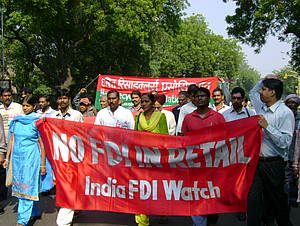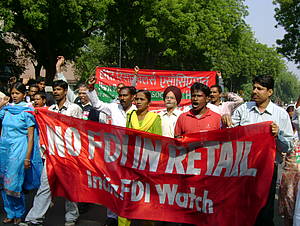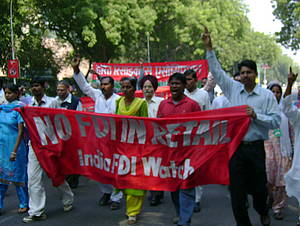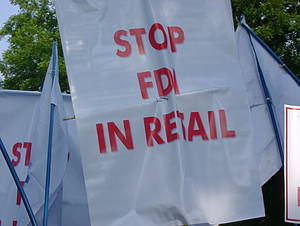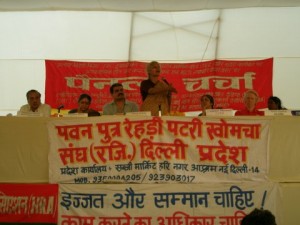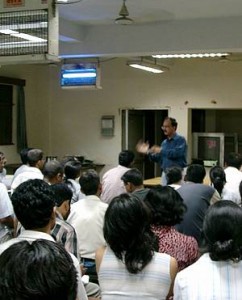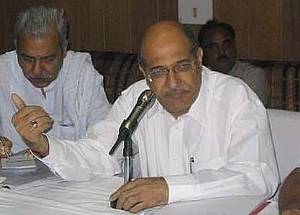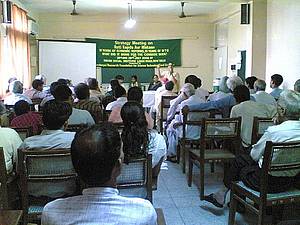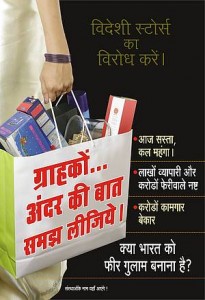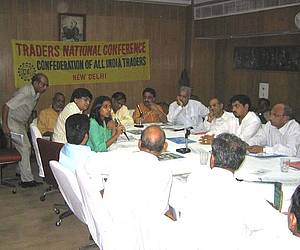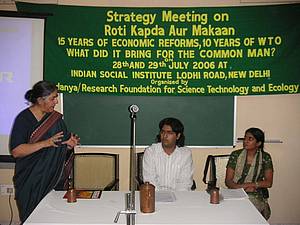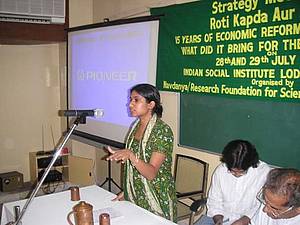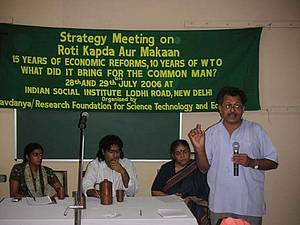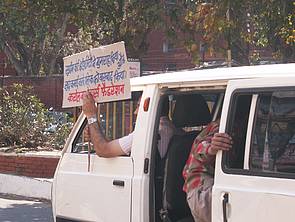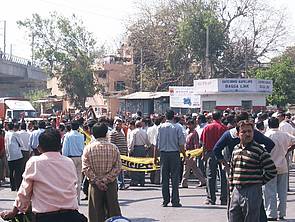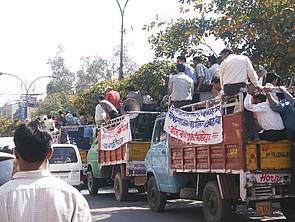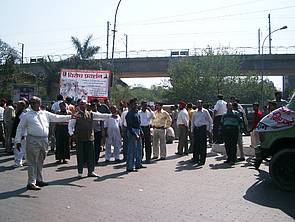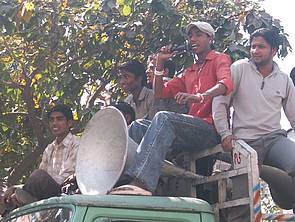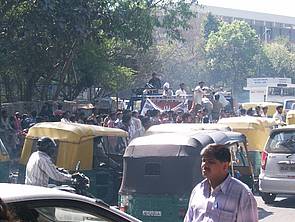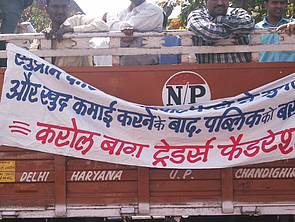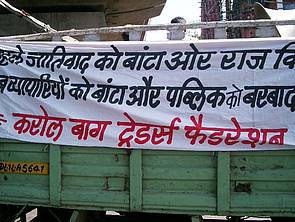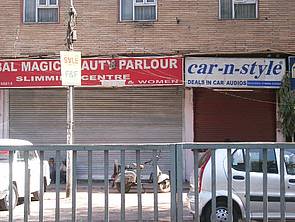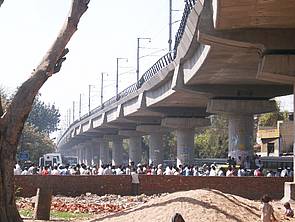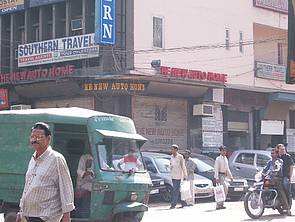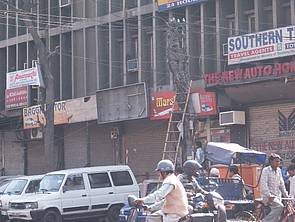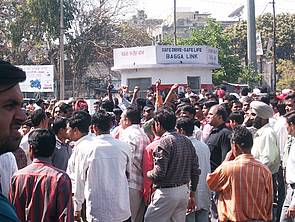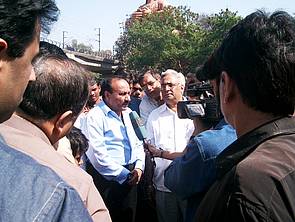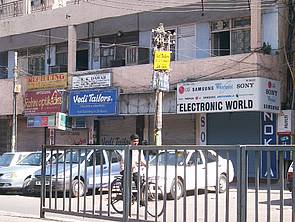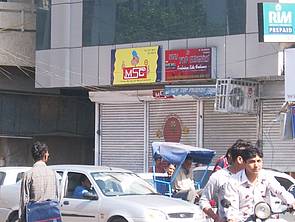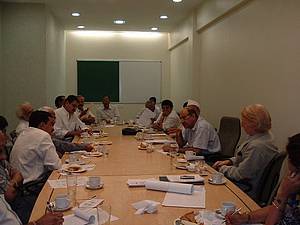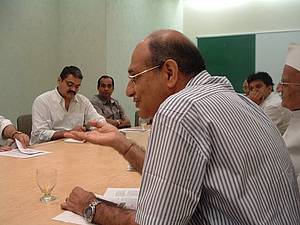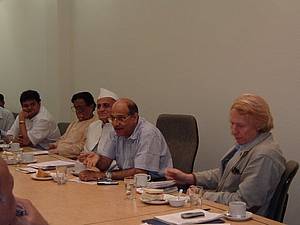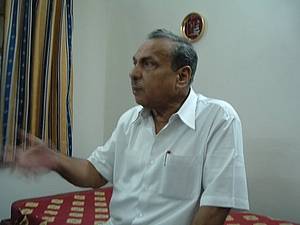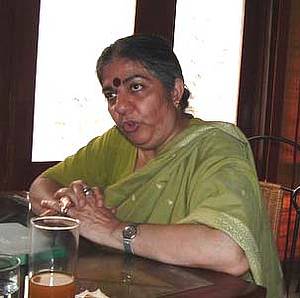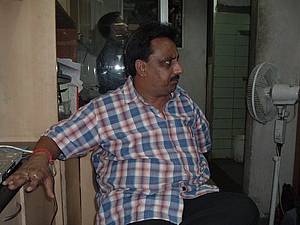Video: Is falling foreign investments a reason to worry
09-06-2011
ACORN India’s FDI Watch campaign was recently featured on an hour long panel discussion on the current status of FDI inflows to India. Video: www.ndtv.com/video/player/money-mantra/is-falling-foreign-investments-a-reason-to-worry/208693
Farmers and vendors blocked and locked the BBMP office
(as reported by Mr. Babu Khan, Campaign Organizer, India FDI Watch, Bangalore)
Bangalore, March 11th 08: Tuesday a busy day for K.R.Puram farmers, traders and vendors, because Tuesday is the weekly market day in this area. Many farmers, local retailers and vendors usually comes to K.R.Puram to sell and purchase the goods. Local people of surrounding areas also visit the market because the vegetables and other commodities are available at cheaper rates. This market is having a history of more than 50 years and the daily market started almost 15 years back to support the local retailers and consumers. Farmers are coming here as far as from 60-70 Kms from rural areas. The business usually starts around 4am in the morning and continues till the evening. More than 2000 local vendors and retailers depend on the market. Farmers, coming from the rural area, to sell vegetables have to pay tax for each bag and vendors also pays daily tax for the small space they occupy.
Along with India FDI Watch, hundreds of farmers and vendors marched towards BBMP office, shouting slogans. They blocked and locked the office, the Deputy commissioner of Bangalore arrived and discussed the issue with protesters and announced that, the issue will be solved within 2 days. For two days no tax will be collected from the farmers. Recently an order was issued by the assistant revenue officer ordering higher taxes for the farmers and retailers. Contractors in nexus with corporation officials were exploiting the farmers and vendors to encourage corporate malls coming around in the area. Protesters demanded immediate removal of the officers and contractors involved in the exploitation of farmers and vendors. They also demanded the Deputy Commissioner that, within the radius of 5Kms of the market, corporation authorities should not give permission for any corporate store. Other demands include basic facilities in the market, drainage and rest house for the farmers.
Spell out stand on retail giants, Nazirudeen tells parties
2-26-2008
Special Correspondent (The Hindu) KOCHI: Kerala Vyapari Vyavasayi Ekopana Samiti (KVVES) president T. Nazirudeen has asked leaders of major political parties in the State to spell out their stand on the entry of retail giants.
“Let CPI(M) leader Pinarayi Vijayan and Congress leader Oommen Chandy publicly come out with their parties’ stands on the issue,” he said.
Mr. Nazirudeen and four others were arrested, and released, in Kozhikode on Sunday for allegedly damaging the outlet of the Birla Group-owned Fabmall. Mr. Nazirudeen claimed that the charges against him were framed and that the KVVES functionaries had only led the blockade of the Fabmall at Nadakkavu, which had opened on August 10.
He told The Hindu that retail traders staged protest demonstrations against the arrests at several places across the State, including Kochi, on Monday. The arrests had doubled the resolve of the KVVES to fight off the retail giants.
He said the KVVES was determined to go ahead with its campaign against the retail giants which would “deny the traders their livelihoods and hurt the consumers’ interests.”
The KVVES, said to be the largest association of retail traders in India, leads the campaign against Reliance, Birla and other retail giants.
Mr. Nazirudeen said that according to law, wholesalers cannot sell goods in retail. But this law was being violated and city corporations and municipalities were issuing licences to these retail giants to open outlets.
Mr. Nazirudeen wanted all the parties to take a strong and effective stand on the issue. He said that though certain parties had offered support to the campaign, the support was not being translated into action.
Indian protests against Wal-Mart fail to ignite
2-26-2008
![]() BY: PALASH KUMAR NEW DELHI, Aug 9 (Reuters) – A few hundred Indian traders and small shopkeepers took to the streets on Thursday to protest against the arrival of U.S. retail giant Wal-Mart, but a planned nationwide day of action fizzled out. Wal-Mart Stores Inc. (WMT.N: Quote, Profile, Research) and India’s Bharti Enterprises (BRTI.BO: Quote, Profile, Research) signed a delayed agreement this week to set up a chain of wholesale outlets jointly.
BY: PALASH KUMAR NEW DELHI, Aug 9 (Reuters) – A few hundred Indian traders and small shopkeepers took to the streets on Thursday to protest against the arrival of U.S. retail giant Wal-Mart, but a planned nationwide day of action fizzled out. Wal-Mart Stores Inc. (WMT.N: Quote, Profile, Research) and India’s Bharti Enterprises (BRTI.BO: Quote, Profile, Research) signed a delayed agreement this week to set up a chain of wholesale outlets jointly.
The entry of foreign retailers, and even the establishment of supermarkets by India’s Reliance Industries Ltd. (RELI.BO: Quote, Profile, Research), has been opposed by some political groups and traders who regard them as a threat to their livelihoods.
“Wal-Mart, Down, Down”, “Wal-Mart, Go Back”, a crowd of about 200 people shouted in Chandni Chowk, a bustling Delhi market. In the financial capital Mumbai, speakers at a protest meeting lamented that only about 200 people had turned up,
Other protests took place in Ranchi in eastern India, where some traders threatened to ransack any new private retail outlets, and Bhopal in central India, where a strike called by communists was partially successful.
“The government policies are today corporate policies,” said activist Vandana Shiva, who led the New Delhi protest. “It’s the ‘raj’ (rule) of Reliance and Wal-Mart.” She said large companies would make the Indian farmer dependent on them for purchases.
In the eastern city of Kolkata, where communists opposed to the entry of foreign retailers are in power, only about 800 traders and shopkeepers held a meeting, far less than the 5,000 people the organisers had expected.
India’s retail industry, valued at nearly $350 billion, is forecast to double in size by 2015, with modern retail’s share of that expected to rise rapidly from about 3 percent now.
India limits multiple-brand retailers like Wal-Mart to wholesale, and franchise deals.
(Additional reporting by Bappa Majumdar in KOLKATA and Krittivas Mukherjee in MUMBAI)
HALLA BOL in Delhi 2008
Delhi-23 Feb: On the heels of the visit of Michael Duke, Vice Chairman of Walmart, hundreds of small shopkeepers and hawkers staged militant protest at the doorsteps of Reliance Fresh, Subhiksha and More in Shakarpur area of Delhi. The protesters forced corporations to down their shutters and locked them. A ten headed tall effigy was also burnt. Each head of the effigy was symbolizing corporations namely Wal-Mart, Tesco, Reliance Fresh, Big Bazaar, Subhiksha, More, Spencers, Big Apple, Metro and Carrefour.
Addressing the protesters, Vijay Prakash Jain, General Secretary, Bhartiya Udyog Vyapar Mandal said “The livelihood of retail traders are at stake. If big corporations like Wal-Mart and Reliance are allowed to enter into the retail trade, small traders and street vendors would be finished. We warn the govt. not to play with the livelihood of traders, manufacturers, hawkers and suppliers. We demand to enact strict law to ban all corporations in retail trade and formulate a National Policy for Retail Trade and Small Manufacturing Industries.” Mr. Jain announced that to strike back and make corporations realise that we will not let them ruin our livelihoods a national mass rally of hundreds of thousands of people will be organized in the Ram Lila ground of Delhi on 23rd April this year.
Ashwani Jain, Convenor of the Halla Bol protest stated “There are 40 million people depending on the retail sector. There are no employment avenues available for our youths and crores of families survive on the retail trade. Those who are saying that new jobs will be created by big corporations in retail need to realize that thousands more will be lost. Mr. Jain further said, “To justify themselves corporations are creating myths. They are creating the myth that they will sell cheap and fresh. But, consumers will have to pay for the high input of corporate retail such as real estate, air conditioning, educated salesmen and women, wasteful consumption of electricity and many more. In the long run, consumers will be the ultimate looser, as once corporate retail drive out their competitors and their monopoly is established they will buy low and sell at high price.
Dharmendra Kumar, Director of India FDI Watch and Convenor of National Movement for Retail Democracy said, “We have gathered here to tell the govt. that traders are ready to come on the streets if monopoly of a few corporations is favoured in the retail sector. The infamous retail giant of the world Wal-Mart has entered from the back door using Bharti-Airtel as its fig leaf circumventing the wholesale cash & Carry permission. This is a gross transgression of the intention behind Wholesale Cash and Carry Permission. Bharti will only be a thin cover for Wal-Mart’s profit making proclivities. Bharti will only function as a fixed margin operator. The warning bells are dire for our small manufacturers, suppliers, shopkeepers and street vendors.”
Hakim Singh Rawat, President, Delhi Hawkers welfare Association said, “Corporate retail intent to hijack the whole supply chain from ‘Farm to Folk’ and establish monopoly by becoming producer, wholesaler, distributor and retailer and targets to dictate the market to fulfill their greed. The hawker sells much fresher than any of these shops. Long distance supply chain and refrigeration means stale fruits and vegetables.
In a press release, Dharmendra Kumar informed that a Halla Bol rally was organized in Trissure of Kerala where hundreds of thousands of traders pledged to resist the corporate hijack of retail trade. According to Mr. Kumar the Halla Bol protests were also organized in major cities across India including Mumbai, Bangalore, Kolkata, Hyderabad, Nagpur, Bhuwneshwar, Allahabad.
HALLA BOL in Bangalore
Bangalore-23 Feb: Street hawkers, retailers and other people joined at Yashawanthpur railway station to protest against corporate retails as a part of national programme of Halla bol. Shouted slogans against the fresh malls. Freedom fighter Mr. Doraiswamy, addressed the gathering and during his speech, said that, already many corporate retail companies have arrived to Bangalore and have started the business but the government is not taking any action to support the local street hawkers, retailers. He requested the mass to continue the struggle to curb the corporate retails and also raised question against police system (because police has threatened the organizers to post pone or cancel the programme and not ready to give the permission for the rally because of Lorry strike. But organizers took firm decision to continue the programme and have done it. Prior to the rally on 22nd of Feb 2008, 3 volunteers along with auto taken to the police station while canvassing the programme. They put under KPA 92(I) act. Police has issued notices to volunteers and today they went to magistrate court and have been fined 250Rs each.) He told that, police should give the support and security for the common people. Most of the police force of country belongs to agriculturist’s family. These companies through contract farming also cheat our farmers. I am here, let the police arrest me first, I am heading this demonstration, let the police arrest. He told that, these are always happens why should go to police and ask their permission. There is no need to ask the permission, we are the people who are protecting democracy and also electing the people to serve the people.
Ex corporator and opposition leader of Bangalore city corporation Mr.D.M. Nanjundappa, one of the guests addressed the gathering and told he will be with the hawkers and retailers of the area whenever needed and suggested the gathering not to bother about police, crores of small traders, retailers and hawkers are depending on this trade for survival. It is our right to protest and give warning to the companies that are demolishing the livelihoods.
During his speech Mr. A.K.Himakar told, if we believe in democracy it is our right to save our livelihood, we are not living in dictators country, irony is that, our people like hawkers, street vendors, retailers are struggling to lead the life where as these corporates are enjoying all the benefits of the government. Whole system of this country is supporting the corporates, what is the alternative left for the people? Government should seriously think on this issue otherwise in near future our hawkers; retailers and traders including farmers are going to hit the corporate stores like uttarpradesh.
Secretary of ASTRA –K, Mr. K.C. Venkatesh also spoke during the programme and told, this programme is national programme, today everywhere in the country our traders, hawkers and vendors are protesting against the corporate high jack of retail. In Kerala, 1lakh people are demonstrating, in Hyderabad, in kolkatta, Indore, Mumbai and all major cities witnessing the demonstarions. Our food security, livelihood, our agriculture is facing serious problems because of the entry of large multinationals in retail and in agriculture if the process continue like this, we don’t know what will happened to our people. We are raising our voices to protect ourselves, our livelihoods are under threat. We are not asking any mercy or any favor from the government. It is our right to protest and we are demanding for national policy on retail.
President of ASTRA –K, Mr. Abdul Hammed addressed the gathering and told, if not today, tomorrow we are going to hit the corporate retails particularly reliance. We made a plan to go in a protest march but the police who should protect us are protecting the companies. Enough is enough in nearby days don’t expect us to follow the rules and regulation and law we are going to break the law let police arrest us. At least we will get food in jail. Retailers, hawkers and traders are under serious crises, does not know what to do, but as a trader I am ready to violent action.
President of Dalit Mahasabha Karnataka Siddaramaiah, Mr. S. Babu of India FDI watch , Mr. Shiva prasad from SUCI, trader leader Mr. Ramu from Nelamangala and local trader leaders also addressed the gathering.
HALLA BOL in Kerala
Total Shut Down and Mammoth Rally of 150,000 Traders in Kerala on Halla Bol
Feb 23, 2008: Traders in Kerala today downed shutters as part of the nation-wide Halla Bol protest against the entry of retail giants into the retail trade. Reports from various parts of the state said the shut down was total. The Kerala Vyapari Vyvasayi Ekopana Samithi (KVVES) and the Kerala State Vyapari Vyvasayi Samithi (KSVVS) had together called for the strike demanding that the Government enact a law to prevent the entry of retail giants. The shut down had support of both the ruling Left Democratic Front (LDF) and the opposition United Democratic Front (UDF) in the state.
More than 150,000 traders marched in Thrissur held a mammoth rally. The speaker of the Kerala Legislative Assembly inaugurated the rally. Many members of parliament and members of Legislative Assemblies were present in the historical rally. Sri Shyam Bihari Mishra, President, Bhartiya Udyog Vyapar Mandal was chief speaker. After the meeting, all the 150,000 people gathered in the meeting lighted candles and pledged to resist the corporate hijack of retail.
Protest marches were also taken out by the KSVVS in different parts of the state. In Thiruvananthapuram, the KSVVS marched to the secretariat. The traders demanded a legislation during the present Assembly session itself. “Now we have thought of approaching the Union Government since the state administration has not heeded our request. Why should corporate entities enter into our retail-trading sector that we have been efficiently managing? Until our demands not to let such big players snatch our livelihood are met, we will carry on our crusade against the entry of Reliance and others,” said Panangottukonam Vijayan, Secretary, Kerala State Vyapari Vyvasai Samithi. The protesters walked to the government secretariat holding banners and shouting slogans against the entry of big retail giants.
The policy of the state government is to see that these retail giants are kept out of the state, Communist Party of India – Marxist (CPI-M) state secretary Pinnarayi Vijayan said at a mammoth gathering of traders in front of Raj Bhavan, the official residence of the Kerala Governor. “The Left is of the firm view that not a single such unit – national or international – be allowed entry into Kerala,” he said. “We at the Left Democratic Front meeting have decided that the local self-governments should not give sanction to such units.”
Only a few days back, Deputy Mayor of Kochi C.K. Mani Shankar had announced opening of retail outlet of the Reliance fresh. But today, Shankar was in the forefront of a protest march in Kochi.
VYAPAR ROZGAR SURAKSHA KRITI SAMITI
![]() Tuesday, 18th December, 2007
Tuesday, 18th December, 2007
In a daring action more then 10,000 mathadi workers ,Traders, Hawkers blocked the main avenue in sector 17, Navi Mumbai today at 4pm , this traffic intersection is also known as Arenja Chowk, completely paralysing the traffic in this satellite town of Mumbai.The effect of this blockade was felt for several hours and the Traffic upto Mumbai was severely affected.
The sight of the 10,000 strong procession as it wound its way gathering momentum like a river coming down a mountain shocked the onlookers policemen who had gathered in hundreds to stop the procession from going to the main Mumbai-Pune highway as announced by the samiti, the look on the policemen said it all, as they wondered that if this disciplined procession were to decide to break the cordon and move to the highway the policeforce gathered would not have been able to stop them.
The procession was led by a Truck on which a live D.J belted out songs and slogans from the professional sound system ( which is normally seen in Ganpati festivals and carnivals) was a first of its kind seen in any protest procession in the city. The leaders led by Shri Mohan Gurnani, Shri Narendra Patil, Shri Sharad Maru, Shri Ashok Baria gave slogans and kept the crowd going.
The procession went thru all the wholesale markets of vegetable, grain fruits which supply the entire agricultural supplies to the 1,30,00,000 population of Mumbai, all the markets closed down their shutters and for the first time both traders and their employees joined the procession in response to the joint appeals and slogans of the Traders and workers.
With every passing market the crowd grew, as it reached the Arenja chowk the procession was surrounded by the waiting policemen and state reserve police and the samiti was asked to stop their procession and not proceed towards the highway, fearing largescale violence the organisers decided that they would end the procession in the middle of the traffic intersection and have a meeting , in a quick conversion one of the busiest streets of Navi Mumbai bccame the open air venue of a protest meeting to demand the national policy to protect retail trade and livelihoods of the workers.
As leaders from the Samiti climbed on to the traffic island which became a temporary dias the crowd of 10,000 settled down and squatted on the streets, all the overlooking commercial buildings stopped their activity as business came to a standstill, there were people standing on their balconies and terraces watching this gathering in the middle of the intersection.
All the speakers from the samiti and the supporting organisations condemned the State and Central government for not being able to protect the livelihoods and stop the entry of national corporations i.e Reliance, Subiksha, More etc and multinationals i.e Wallmart , Metro etc. into the retail trade. They warned the State government and the chief Minister that if they did not get a response within 8 days , the samiti would take millitant action and block traffic in diffrent places and move the protests at the doorsteps of the Corporations.
The protest ended peacefully with a call fom all organisations to take a delegation to meet the C.M and demand action in the next few days , the meeting which was well covered by the print and electronic media ended in slogans of ” Go Back Wall-Mart” and ” Corporations Quit Retail”.
Dare To Struggle Dare To Win.
Vinod Shetty. India FDI Watch
Start urban jobs guarantee scheme: Karat
10-12-07
![]() BY: THE HINDUSTAN TIMES
BY: THE HINDUSTAN TIMES
The Communist Party of India- Marxist (CPI-M) leader Prakash Karat on Monday urged the central government to introduce employment guarantee scheme for the poor in the urban areas on the lines of the rural guarantee scheme.
“We want the centralovernment to now introduce urban employment scheme for the poor,” said Karat while addressing a rally in Shimla for the elections to the 68-member state assembly.
Reiterating the Left parties’ stand on foreign direct investment (FDI) in the retail sector he said, “We will continue to oppose FDI in the retail sector.”
Karat said his party would oppose the bill to regulate private universities that would allow the entry of foreign universities in the country.
“The Left will not allow the passing of the private universities bill. Please understand we are trying to play the role of the opposition despite our support to the government at the centre,” he said.
The CPI-M is fighting the Shimla and six other assembly seats.
The second and final phase of the polls will take place on December 19 for 65 seats and the counting starts December 28. The first phase for three seats was held on November 14.
Rathke’s Take: Big is not beautiful in retail
![]() Published in the Economic Times, 9-29-2007
Published in the Economic Times, 9-29-2007
IS RELIANCE Retail going the Wal-Mart way? The opposition to Reliance’s retail business in India is quite similar to the opposition that Wal-Mart has generated in the US. This similarity becomes even more obvious when one looks at the ways in which activists have initiated their campaign. Not only is the modus-operandi common, even the people spearheading the activities are veteran anti-Wal-Mart activists.
Wade Rathke, undisputably the most prominent and vocal opponent of Wal-Mart internationally, has been in regular touch with the leaders of the India FDI Watch campaign. Mr Rathke is the chief organiser of Association of Community Organisations for Reform Now (ACORN) which also mobilised the public in South Korea and Germany, the two markets from where Wal-Mart subsequently withdrew. “I have been in touch with various stakeholder groups in India, including small traders, farmers and suppliers,” says Mr Rathke.
It is interesting to note that the campign is targeting farmers as well, because the biggest benefit ascribed to organised retail is that farmers will get a better price for their produce. However, Mr Rathke has a different take on this issue. “The farmers need to understand the long-term plan of these corporates. Once a farmer is into this vicious circle, may be 2-3 years down the line, he will be left with no option but to surrender his land to one of these corporate giants,” he says.
Mr Rathke has been a professional campaign organiser for the last 35 years and has founded a series of organisations on the issues of social justice and worker rights. He also spearheads a union of Wal-Mart workers, though the company has not accorded official recognition to the forum. ACORN is one of the largest community organisations in the US. Mr Rathke has been particularly vocal against Wal-Mart’s labour practises in the US, having initiated a series of litigations and labour movements against the Bentonville retailer, which has on many occasions, been in the line of fire for violating labour laws in the US, Canada and some European countries. In January 2006, Wal-Mart had to pay $135,540 to settle federal charges that it violated child labour laws in Connecticut, Arkansas and New Hampshire. Still earlier, in March 2000, the company was fined $205,650 for violations of labour laws in one out of every 20 stores in the state of Maine, US.
100 hours dharna by traders against corporate retail
Bhartiya Udyog Vyapar Mandal under the leadership of its President Sh. Shyam Bihari Mishra organized a one hundred hour (from 11 Sept. to 15 Sept.) dharna at Jantar Mantar in Delhi demanding corporations to quit retail and agriculture.
On 11 Sept. around two thousand traders joined the protest from Kerala under the leadership of Mr. Naziruddin, President, Kerala Vyapari Vyavsayi Ekopana Samiti. Eight Members of Parliament from Kerala belonging to Communist Parties also joined traders. Later the traders marched to the parliament and submitted a memorandum to the Prime Minister demanding a complete ban on corporations coming into the retail trade.
On 12 Sept. around twenty thousands farmers under the leadership of Sh. Mahendra Singh Tikait, President, Bhartiya Kisan Union (BKU) joined the traders sitting on the dharna. Sh. Tikait also met the Prime Minister and raised the concerns of the farming community of India. The Prime Minister assured Mr. Tikait that the Indian Govt. would never compromise with the interests of Farmers. Addressing the dharna, farmers leaders coming from various states stated that corporations are trying to fool farmers by promising better prices for their produce and thus trying to put farmers vis a vis retailers. Farmers leaders urged the farmers to defeat the sinister design of corporations to divide farmers and traders. They asserted that corporations have never done good to any society and only destroys local economy, land, ecology and culture.
Thousands of traders from 22 states of India participated in the protest from 11 to 15 sept. Key politicians who addressed the protest includes Mr. Murli Manohar Joshi, Senior Leader of BJP and Chairman, Parliamentary Committee on Commerce, Mr. Sharad Yadav, President, Janta Dal (United) and MP. Key Traders leaders who actively participated includes Mr. Velliyan from Tamil Nadu, Mr. Mohan Gurnani from Maharashtra, Mr. Manohar Lal Kumar, and Mr. Naren Bhiku Ram Jain from Delhi. A delegation of traders under the leadership of Mr. Vijay Prakash Jain, General Secretary, Bhartiya Udyog Vyapar Mandal also met Mr. Kamal Nath, the Minister for Commerce and Industry and submitted the charter of demand to oust corporations from the retail sector and formulate a national policy on retail trade.
Quit Retail 2007
All India action on 8th and 9th August, 2007 to stop Corporate hijack of retail and Backdoor Entry of Wal-Mart.
Vyapar Rozgar Bachao Aandolan: A Movement for Retail Democracy, an alliance of mass based organizations traders, hawkers, farmers, trade unions, cooperatives, Consumer groups and civil society organizations in coordination with organizations around the country declares to organize a National Day of Action on August 8th and 9th, in commemoration of the Quit India Movement (http://gandhi-manibhavan.org/activities/quit_india.htm) and calling on Corporations to Quit Retail.
As you know, the historic session of the All India Congress Committee began on the 7th August 1942 and was concluded after midnight of 8th/9th August 1942 at Gowalia Tank Maidan, Mumbai.
The resolution was passed unanimously. The resolution which came to be known as ‘Quit India Resolution’ created on ‘electrifying atmosphere’ in the country. The movement, led by Mahatma Gandhi, gave the country two famous slogans. The first was aimed at the British ruling India: ‘Quit India’ [Bharat chhodo]. The second was aimed at Indians, telling them how to achieve the first: ‘Do or die’ [Karenge ya marenge]. Both slogans have since gone down in the annals of Indian history as uniting the nation towards the goal of Independence.
“I want freedom immediately, this very night before dawn if it can be had.. we shall free India or die in the attempt, we shall not live to see the perpetuation of our slavery”, declared Mahatma Gandhi, as the British resorted to brutal repression against non-violent satyagrahis. The Quit India movement was launched at a time when several factors were in the favour of the freedom fighters. Great Britain was fighting a losing war on two fronts. In Europe it was defending its country against Hitler. In the east, Japan had been capturing her possessions like Burma.
After the great revolt of 1857, the Quit India movement was the next great uprising that ultimately helped India achieve freedom. Students and teachers forsook the colleges. Factories were closed. There were mob-violence and riots. Before the year was over, there were 600 police firings and thousands killed, and the prisons of the country were full. Over a lakh of persons were convicted and sentenced.
8th and 9th August 2007 marks the 65th anniversary of the Quit India movement, the final campaign by the Indians against the British empire. The movement ended five years later in Independence.
Thousands protested to oppose the Bharti-Walmart Joint Venture
![]() On the heels of the announcement of the Bharti-Walmart joint venture, thousands of traders, hawkers, farmers and workers protested across India. Protesters also included a group of American students who demanded that Wal-Mart not be allowed into India. Mass-based organizations called on the Prime Minister and Sonia Gandhi to immediately stop the Bharti-Walmart Joint Venture and not allow Wal-Mart’s backdoor entry into India. There was also a strong united call on all corporations—both foreign and domestic—to “Quit Retail”. The protests were timed to commemorate the start of the “Quit India” movement, which started on August 9, 1942, with mass-based sections of society drawing parallels to the East India Company and companies like Wal-Mart, Bharti and Reliance.
On the heels of the announcement of the Bharti-Walmart joint venture, thousands of traders, hawkers, farmers and workers protested across India. Protesters also included a group of American students who demanded that Wal-Mart not be allowed into India. Mass-based organizations called on the Prime Minister and Sonia Gandhi to immediately stop the Bharti-Walmart Joint Venture and not allow Wal-Mart’s backdoor entry into India. There was also a strong united call on all corporations—both foreign and domestic—to “Quit Retail”. The protests were timed to commemorate the start of the “Quit India” movement, which started on August 9, 1942, with mass-based sections of society drawing parallels to the East India Company and companies like Wal-Mart, Bharti and Reliance.
Agitations took place in the metro cities of Delhi, Mumbai, Bangalore and Kolkata along with other major cities including, Kalicut, Bhopal, Jaipur, Ranchi, Balia, Meerath, Sonipat, Nagpur, Nasik, Pune and Indore.
In Delhi, thousands of traders, hawkers, farmers and workers protested in Chandni Chowk, a historical market, and burned effigies of Wal-Mart, Bharti and Reliance. Dharmendra Kumar, Director of India FDI Watch and national coordinator of the Vyapaar Aur Rozgaar Bachao Andolan conducted the proceedings and told the agitators, “Both Sonia Gandhi and Manmohan Singh have acknowledged the dangers of corporations entering into the retail sector. The Govt. has commissioned a report looking at the impact of the entire supply chain on livelihoods after Sonia Gandhi had written a letter of caution. Sonia Gandhi had also publicly refused to meet with Michael Duke, Wal-Mart Vice-Chairman during his visit in February after public demonstrations were held due to his arrival. However, both Sonia Gandhi and the PMO have remained silent on the Bharti-Wal-Mart deal and though they have publicly cautioned against corporations and commissioned a study, they have taken no subsequent actions. He demanded that the Wal-Mart Bharti joint venture should be immediately revoked and all corporations should be stopped until thorough study has been conducted by an independent special task force comprising of stakeholders.”
Shyam Bihari Mishra, President, Bhartiya Udyog Vyapar Mandal refered back to the British Raj, stating, “The East India Company, the most powerful company at the time, came to colonize India’s people and domestic and international trade and now Wal-Mart, the world’s largest company is trying to enter India to do the same. Mr. Mishra said India has a history of resistance, our people threw out the British and sixty years later if millions have their businesses and livelihoods threatened we will do the same now. He announced that family members of traders would boycott corporate stores.” Praveen Khandelwal, General Secretary, Confederation of All India Traders (CAIT) said “The livelihoods of retail traders are at stake. If big retail giants like Wal-Mart and Reliance come into the country, small traders would be finished.” A mass campaign would be launched to strike back and make corporations realise that we will not let them ruin our livelihoods, he said.
Vandana Shiva, Director, Navdanya said “India is a land of retail democracy- hundreds of thousands of weekly haats and bazaars are located across the length and breadth of our country by people’s own self-organizational capacities. In a country with large numbers of people, and high levels of poverty, the existing model of retail democracy is the most appropriate in terms of economic viability and ecological sustainability.”.
Shaktiman Ghosh, General Secretary, National Hawkers Federation warned the government “about taking such strong stances against India’s millions of hawkers and small shopkeepers in favor of only a few huge corporations who seek to dominate the Indian retail market.”
Mr. Indu Prakash of Campaign for Judicial Accountability and Reform revealed the nexus between judiciary and corporate retail which led to the ceiling of shops of more than one hundred thousands of traders of Delhi and still goes on.
Mr. Bhati of Bhartiya Mazdoor Sangh, Delhi, Harbhajan Singh Siddhu, National Secretary, Hind Mazdoor Sabha, Sunil Kansal, Secretary, Rashtriya Vyapar Mandal, Hakim Singh Rawat, General Secretary, Delhi Hawkers Welfare Association, Banwari Lal Sharma, President, Aazadi Bachaon Aandolan, R K Sharma, Secreatry, UTUC-Lenin Sarani and Venkatesh of Lok Raj Sangathan also addressed the protesters in Delhi.
In Mumbai, thousands of retailers, hawkers, workers and cooperatives participated in a one day trade bandh and a mass public event organized by the Vyapaar Rozgaar Suraksha Kriti Samiti, a joint action committee of trade associations, hawkers groups, trade unions and others. Leaders of Federation of Associations of Maharastra (FAM), Retail and Dispensing Chemists Association (RDCA), India FDI Watch, Mumbai Mahanagar Vyapari Seva Parishad (MMVSP), Mumbai Vyapar Mahasang (MVM), Apna Bazaar, National Hawkers Federation, Center of Indian Trade Unions (CITU) and Hind Mazdoor Kisan Panchayat (HMKP) addressed the protesters. Mohan Gurnani, Convener of the Mumbai based Vyapaar Rozgaar Suraksha Kriti Samiti and President of the Federation of Associations of Maharastra (FAM) said “organised retaling would leave 20 crore people without jobs. Let the government first come out with a rehabilitation for these people and then it can open up FDI in retail”. Kishore Shah, President of the Mobile & Telecom Retailers and Distributors Association (MTRDA), stated that around 12,000 retail shop-keepers deal in SIM cards and recharge vouchers of Air-Tel in Mumbai, generating business worth crores of rupees every day. Mr. Shah said “We have already informed all our members, distributors and wholesalers against selling any Airtel products”. The Mumbai APMC—wholesale— market remained closed, along with thousands of retail shops across the city, including all chemists and druggists shops. Apna Bazaar, Maharastra’s largest cooperative store also downed its shutters and wholesale markets remained closed in Nasik and Pune.
At an evening event at Shanmukananda Hall in Mumbai mass-based groups laid out a future course of action and adopted a charter of demands. They called on the Center to immediately repeal the Wholesale Cash-n-Carry Permission, and all licenses granted under the permission; repeal the APMC Model Act, implement the National Policy on Street Vendors, take measures against predatory pricing and formulate a national policy on retail trade and small scale industries.
In Bangalore thousands protested at the town hall and burned effigies of corporate retailers like Wal-Mart and Reliance. The protest culminated in leaders presenting the Governor with a memorandum calling on the state to repeal the recent passage of the APMC Model Act. A Charter of Demands, same as was passed in Mumbai, was also placed before the District Collector. Smaller protests were organized throughout the state in different districts including Kodagu, Bijapur, Gulbarga and Davangere districts.
In Jaipur fifty American students joined with hawkers demanding that Wal-Mart leave India and demanding implementation of the National Policy on Street Vendors. The American students and hawkers demonstrated in the old city and held signs saying “Americans Oppose Wal-Mart Everywhere”. Ms. Cheryl, an American citizen, learning Hindi at Jaipur said that Wal-Mart has a disastrous impact on small shopkeepers and neighbourhood communities in America and called Indians to learn from their experience and not to allow Wal-Mart to operate in India. Ms. Cheryl said that the world is moving from ‘Corporate to Cooperative’ and Indians should not corporatize their cooperatives.
In Kerala the Kerala Vyapari Vyavasayi Egono Samiti organized protest marches in over 1000 places across the state. In Kalicut over 10,000 traders protested in front of the corporation’s office and submitted a memorandum demanding that corporations keep out of retail and the immediate halt to Wal-Mart’s backdoor entry and the repeal of the Wholesale Cash-N-Carry permission.
In Kolkata the Federation of Trade Organizations (FTO) of West Bengal organized protests in all the 12 districts of the city along with protests across West Bengal, including in front of malls. Tens of thousands traders participated in the protest. In the evening, thousands of hawkers took out a protest march from the city museum.
In Ranchi, Uday Shankar Ojha who led the vegetable vendors before Reliance Fresh in May and has only recently been released from Jail, led thousands of hawkers and vegetable vendors at Albert Ekka Chowk in Ranchi, demanding that Reliance Fresh and all other corporations leave the retail sector and “withdraw their sinister plans to displace millions of livelihoods”.
In Bhopal there was a state-level protest meeting in the morning at Gandhi Bhavan and traders sat on a dharna at Roshanara Chowk in the afternoon and burn effigies of Wal-Mart, Bharti and Reliance. A call for Bhopal Bandh was given for 21 August to oust corporate from retail trade.
Similar protests were organized in other cities including Allahabad, Lucknow, Meerut, Bagpat and Sonipat.
Highlights of 8th and 9th August all India Action
![]()
In Delhi: On 9th August thousands of protesters will march from Red Fort to Chandni Chowk in Delhi and burn the effigy of Reliance, Wal-Mart and Bharti.
In Mumbai: A call for Mumbai trade bandh has been given for August 9. Beside the bandh, people will hold a protest meeting early in the morning at the place where Gandhi ji issued the call to ‘Do or Die’ on 8th August, 1942 and called British to ‘Quit India’, i.e. Gowalia Tank Maidan (since re-named August Kranti Maidan). In the evening, thousands will gather for a mass meeting at Sanmukhanand Hall to call Corporations to quit retail.
In Kolkata: On 9th August, massive protest march will be held and effigies of Reliance, Wal-Mart and Bharti will be burnt. Hawkers to stage demonstrations at ten places in the city.
In Chennai: A massive demonstration will take place on August 9 and effigies of Reliance, Wal-Mart and Bharti will be burnt calling ‘Corporations to Quit Retail’.
In Kalicut: Thousands to march and burnt effigies.
In Ranchi: Mr. Uday Shankar Ojha who led the demonstrations of vegetable vendors before Reliance Fresh outlets and faced the repression of the state. Ten criminal cases were framed against him and others. Nearly after one month, only a few days back he has been freed from Jail. Mr. Ojha will once again lead a massive demontration at Albert Chowk of Ranchi and burn the effigies of Reliance, Wal-Mart and Bharti on 9th August.
In Bangalore: A protest march will take place from Gandhi statue to Subhash Chandra Bose Statue.
In Bhopal: On 9th August, a protest march will be held on Roshan Aara Chowk and effigies of Reliance, Wal-Mart and Bharti will be burnt.
In Nagpur: A demonstration will take place and effigies of Reliance, Wal-Mart and Bharti will be burnt.
On 8th August demonstrations will be held before district headquarters in all over India and effigies of corporation will be burnt calling them to quit retail.
April Campaign Update – National Convention to Resist Corporate Hijacking of Retail
In Delhi India FDI Watch campaign moved towards broadening and consolidating its support base. Amidst announcements of Wal-Mart’s joint venture with Sunil Bharti Mittal’s, Bharti Group in its attempts to enter the Indian retail market, leaders of mass based organizations and scores of anti-Wal-Mart and anti-corporate retail campaigners joined together on 22nd April in the Convention to resist corporate hijack of retail organized by India FDI Watch in Delhi. In the convention, prominent trade associations, trade unions, farmers organizations, hawkers unions and NGOs declared their joint resistance to corporate retail and vowed to oppose and challenge the entry of large multi-national’s like Wal-Mart and domestic retailers like Reliance into the retail sector.
The convention endorsed a joint resolution demanding that the government immediately stop the Bharti-Wal-Mart deal. The joint declaration also called on the government to legislate to close all loopholes in the Wholesale Cash-n-Carry Act, which is facilitating the backdoor entry of Wal-Mart into the retail sector. The joint resolution called once again on the PMO to move forth in a transparent manner in electing a Special Task Force, in which affected representatives would be represented, to fully examine the impact that corporate retail will have on traders, hawkers, farmers, workers and small industries.
Addressing the convention, American labor leader and well-know anti-Wal-Mart campaigner, Wade Rathke, called upon the affected Indian stakeholders to build up a broader and powerful resistance to “corporate killing of Indian retail”. He shared a recent story that was published two days back in the New York Times, the United States’ largest newspaper, which revealed that Wal-Mart had been spying on ACORN offices in the United States. On the impact of the retail behemoths, Rathke said, “big retailers like Wal-Mart can sustain losses for many years to make small businesses shut their shops. They can very well indulge in predatory pricing for their gains and squeeze suppliers to offer cheaper prices”. Drawing instances of how Wal-Mart killed small-scale retailer in other developing countries, Rathke said “in Mexico, Wal-Mart captured 50 percent of the market in less than 15 years and the government is now evaluating laws to protect domestic businesses. A number of Asian countries including China, Japan, Thailand the Philippines and Malaysia have imposed restrictions on multi-national retailers, including zonal restrictions, sourcing requirements and caps of the number of stores a foreign retailer can build in a certain locality. The Indian government should also follow suit”
Others present at the National Meeting to Oppose Corporate Retail were; prominent social activist, Vandana Shiva, Praveen Khandalwal, General-Secretary of Confederation of All India Traders, CITU leader Tapan Sen, National Hawker’s Federation President, Shaktiman Ghosh, All India Kisan Sabha Leader, Nurul Huda, JNU Students Union Vice President, William Tyler and others.
Praveen Khandelwal, said “Wal-Mart and Reliance type retail behemoths would ruin the Indian retail and agriculture sectors and push the millions employed in these sectors into unemployment. We know for a fact that small retailers and vendors are impacted when large corporations enter into the retail sector, the Government should be restricting their entry, but instead are allowing them in through the “back-door”. Dr. Vandana Shiva supported the traders and hawkers in their struggle and added that these huge corporations will be investing almost over 60 to 65% directly into the agriculture sector by contracting directly with farmers, and as Reliance Fresh is currently doing. She urged all present that this is a struggle that incorporates the entire supply chain, which corporations like Wal-mart and Reliance are seeking to control, which will start with the farmer and small producer and end with the monopoly of the retail market.
Press Conference against Corporate Hijack on Retail and Back door entry of Wal-Mart
On 23rd April, India FDI Watch organized a press conference in Delhi. It was well attended particularly by print media. A National Joint Action Committee for Retail Democracy was announced at the press conference. The press conference was addressed by traders leader Praveen Khandelwal, General Secretary, Confederation of All India Traders, Dr. Vandana Shiva, prominent social activist and Wade Rathke, American labor leader.
Praveen Khandelwal announced the Joint Action Committee for Retail Democracy, a committee comprised of mass-based organizations of traders, hawkers, farmers and trade unions. He also announced to launch a nationwide campaign against corporate retail on August 9th, the day on which Gandhi ji started ‘Quite India Movemnet’ in 1942, as “Corporations Quit Retail and Agriculture’ and announced that they will be mobilizing for mass based actions and trade bandhs on that day.
Mr. Wade Rathke, head of the US-based community organization ACORN, who was here as part of a global campaign to spread awareness about the harmful affects of Wal-Mart also addressed the press meet. Mr. Rathke shared the experience of Wal-Mart in the United States, particularly their anti-union policies and numerous pending lawsuits for workers discrimination and various labor violations. He cited numerous examples of communities in the United States that have successfully blocked Wal-Mart from entering into rural and suburban communities, the most notable of which is the fact that “after 40 years, Wal-Mart is still not in over half the cities in the United States because powerful coalitions of small businesses, unions, community organizations and local politicians have successfully hindered their growth in urban America.”
He noted that Wal-Mart continues to be targeted in the United States for their bad corporate practices. He added, “that for thirty years Wal-Mart was allowed to expand and grow in the US without any government oversight. It has been too late for many of the US’s small business families and American workers’ are facing some of the toughest times ever”. He has come to spread the message in India before “it is too late for workers, small businesses and communities here.”
Dr. Vandana Shiva stated that “India’s two largest sources of employment and livelihoods are in the retail and agriculture sectors, the two sectors which the nation and the world’s largest corporations seek to enter and control. The government is allowing for the corporate hijacking of retail and agriculture by changing such policies as the APMC Act, which allows for contract farming, and allowing for multi-national corporations to enter in through the back-door under the Wholesale Cash-N-Carry act, which Wal-Mart is currently doing.”
Thousands protested to oppose the Bharti-Walmart Joint Venture
On the heels of the announcement of the Bharti-Walmart joint venture, thousands of traders, hawkers, farmers and workers protested across India. Protesters also included a group of American students who demanded that Wal-Mart not be allowed into India. Mass-based organizations called on the Prime Minister and Sonia Gandhi to immediately stop the Bharti-Walmart Joint Venture and not allow Wal-Mart’s backdoor entry into India. There was also a strong united call on all corporations—both foreign and domestic—to “Quit Retail”. The protests were timed to commemorate the start of the “Quit India” movement, which started on August 9, 1942, with mass-based sections of society drawing parallels to the East India Company and companies like Wal-Mart, Bharti and Reliance.
Agitations took place in the metro cities of Delhi, Mumbai, Bangalore and Kolkata along with other major cities including, Kalicut, Bhopal, Jaipur, Ranchi, Balia, Meerath, Sonipat, Nagpur, Nasik, Pune and Indore.
In Delhi, thousands of traders, hawkers, farmers and workers protested in Chandni Chowk, a historical market, and burned effigies of Wal-Mart, Bharti and Reliance. Dharmendra Kumar, Director of India FDI Watch and national coordinator of the Vyapaar Aur Rozgaar Bachao Andolan conducted the proceedings and told the agitators, “Both Sonia Gandhi and Manmohan Singh have acknowledged the dangers of corporations entering into the retail sector. The Govt. has commissioned a report looking at the impact of the entire supply chain on livelihoods after Sonia Gandhi had written a letter of caution. Sonia Gandhi had also publicly refused to meet with Michael Duke, Wal-Mart Vice-Chairman during his visit in February after public demonstrations were held due to his arrival. However, both Sonia Gandhi and the PMO have remained silent on the Bharti-Wal-Mart deal and though they have publicly cautioned against corporations and commissioned a study, they have taken no subsequent actions. He demanded that the Wal-Mart Bharti joint venture should be immediately revoked and all corporations should be stopped until thorough study has been conducted by an independent special task force comprising of stakeholders.”
Shyam Bihari Mishra, President, Bhartiya Udyog Vyapar Mandal refered back to the British Raj, stating, “The East India Company, the most powerful company at the time, came to colonize India’s people and domestic and international trade and now Wal-Mart, the world’s largest company is trying to enter India to do the same. Mr. Mishra said India has a history of resistance, our people threw out the British and sixty years later if millions have their businesses and livelihoods threatened we will do the same now. He announced that family members of traders would boycott corporate stores.” Praveen Khandelwal, General Secretary, Confederation of All India Traders (CAIT) said “The livelihoods of retail traders are at stake. If big retail giants like Wal-Mart and Reliance come into the country, small traders would be finished.” A mass campaign would be launched to strike back and make corporations realise that we will not let them ruin our livelihoods, he said.
Vandana Shiva, Director, Navdanya said “India is a land of retail democracy- hundreds of thousands of weekly haats and bazaars are located across the length and breadth of our country by people’s own self-organizational capacities. In a country with large numbers of people, and high levels of poverty, the existing model of retail democracy is the most appropriate in terms of economic viability and ecological sustainability.”.
Shaktiman Ghosh, General Secretary, National Hawkers Federation warned the government “about taking such strong stances against India’s millions of hawkers and small shopkeepers in favor of only a few huge corporations who seek to dominate the Indian retail market.”
Mr. Indu Prakash of Campaign for Judicial Accountability and Reform revealed the nexus between judiciary and corporate retail which led to the ceiling of shops of more than one hundred thousands of traders of Delhi and still goes on.
Mr. Bhati of Bhartiya Mazdoor Sangh, Delhi, Harbhajan Singh Siddhu, National Secretary, Hind Mazdoor Sabha, Sunil Kansal, Secretary, Rashtriya Vyapar Mandal, Hakim Singh Rawat, General Secretary, Delhi Hawkers Welfare Association, Banwari Lal Sharma, President, Aazadi Bachaon Aandolan, R K Sharma, Secreatry, UTUC-Lenin Sarani and Venkatesh of Lok Raj Sangathan also addressed the protesters in Delhi.
In Mumbai, thousands of retailers, hawkers, workers and cooperatives participated in a one day trade bandh and a mass public event organized by the Vyapaar Rozgaar Suraksha Kriti Samiti, a joint action committee of trade associations, hawkers groups, trade unions and others. Leaders of Federation of Associations of Maharastra (FAM), Retail and Dispensing Chemists Association (RDCA), India FDI Watch, Mumbai Mahanagar Vyapari Seva Parishad (MMVSP), Mumbai Vyapar Mahasang (MVM), Apna Bazaar, National Hawkers Federation, Center of Indian Trade Unions (CITU) and Hind Mazdoor Kisan Panchayat (HMKP) addressed the protesters. Mohan Gurnani, Convener of the Mumbai based Vyapaar Rozgaar Suraksha Kriti Samiti and President of the Federation of Associations of Maharastra (FAM) said “organised retaling would leave 20 crore people without jobs. Let the government first come out with a rehabilitation for these people and then it can open up FDI in retail”. Kishore Shah, President of the Mobile & Telecom Retailers and Distributors Association (MTRDA), stated that around 12,000 retail shop-keepers deal in SIM cards and recharge vouchers of Air-Tel in Mumbai, generating business worth crores of rupees every day. Mr. Shah said “We have already informed all our members, distributors and wholesalers against selling any Airtel products”. The Mumbai APMC—wholesale— market remained closed, along with thousands of retail shops across the city, including all chemists and druggists shops. Apna Bazaar, Maharastra’s largest cooperative store also downed its shutters and wholesale markets remained closed in Nasik and Pune.
At an evening event at Shanmukananda Hall in Mumbai mass-based groups laid out a future course of action and adopted a charter of demands. They called on the Center to immediately repeal the Wholesale Cash-n-Carry Permission, and all licenses granted under the permission; repeal the APMC Model Act, implement the National Policy on Street Vendors, take measures against predatory pricing and formulate a national policy on retail trade and small scale industries.
In Bangalore thousands protested at the town hall and burned effigies of corporate retailers like Wal-Mart and Reliance. The protest culminated in leaders presenting the Governor with a memorandum calling on the state to repeal the recent passage of the APMC Model Act. A Charter of Demands, same as was passed in Mumbai, was also placed before the District Collector. Smaller protests were organized throughout the state in different districts including Kodagu, Bijapur, Gulbarga and Davangere districts.
In Jaipur fifty American students joined with hawkers demanding that Wal-Mart leave India and demanding implementation of the National Policy on Street Vendors. The American students and hawkers demonstrated in the old city and held signs saying “Americans Oppose Wal-Mart Everywhere”. Ms. Cheryl, an American citizen, learning Hindi at Jaipur said that Wal-Mart has a disastrous impact on small shopkeepers and neighbourhood communities in America and called Indians to learn from their experience and not to allow Wal-Mart to operate in India. Ms. Cheryl said that the world is moving from ‘Corporate to Cooperative’ and Indians should not corporatize their cooperatives.
In Kerala the Kerala Vyapari Vyavasayi Egono Samiti organized protest marches in over 1000 places across the state. In Kalicut over 10,000 traders protested in front of the corporation’s office and submitted a memorandum demanding that corporations keep out of retail and the immediate halt to Wal-Mart’s backdoor entry and the repeal of the Wholesale Cash-N-Carry permission.
In Kolkata the Federation of Trade Organizations (FTO) of West Bengal organized protests in all the 12 districts of the city along with protests across West Bengal, including in front of malls. Tens of thousands traders participated in the protest. In the evening, thousands of hawkers took out a protest march from the city museum.
In Ranchi, Uday Shankar Ojha who led the vegetable vendors before Reliance Fresh in May and has only recently been released from Jail, led thousands of hawkers and vegetable vendors at Albert Ekka Chowk in Ranchi, demanding that Reliance Fresh and all other corporations leave the retail sector and “withdraw their sinister plans to displace millions of livelihoods”.
In Bhopal there was a state-level protest meeting in the morning at Gandhi Bhavan and traders sat on a dharna at Roshanara Chowk in the afternoon and burn effigies of Wal-Mart, Bharti and Reliance. A call for Bhopal Bandh was given for 21 August to oust corporate from retail trade.
Similar protests were organized in other cities including Allahabad, Lucknow, Meerut, Bagpat and Sonipat.
Hunger strike against corporate retail in Chennai
June 15th 2007
Chennai, Tamil Nadu—At around 9am on 15th of June 2007 around 800 people gathered near the Chepauk Cricket Stadium opposite of the Government guest house shouting slogans against the WTO, neo-liberal trade agreements and the rise of corporate retail. The government of Tamilnadu has given permission to corporate retailers like Reliance, ITC and others contract directly with farmers and do business on a massive-scale, with out putting any restrictions that may protect the livelihoods of farmers and those already involved in the retail trade.
The hunger strike was organized by the Tamil Nadu Vanigar, Samgankalin Peravar (Tamil Nadu Traders’ Association Federation), headed by T. Vellaiyan. The Tamil Nadu Traders’ Association is a mass based organization, which has been resisting the entry of foreign retailers and growth of corporate retail for many years.
Traders from different districts of the state assembled at the venue. All the traders wore white shirt and white dhoti and created an atmosphere that resembled the days of the independence movement struggle. T. Vellaiyan addressed the media people about the purpose of the hunger strike.
T. Vellaiyan cited the examples of the WTO and other trade agreements supported by the Center government that are facilitating the entry of corporations into the retail sector. He said that “this is why our traders, hawkers and other stake holders are on the streets, today because big corporate companies are pushing us to the streets. We are opposing the state government and the central government in this regard.”
Mr. Vellaiyan, went on, “We know how to do business of tamarind, we know where the goods are coming to the state and our markets, how to supply and to do business has been learnt through our experiences of forefathers. We are not from different countries are born here and going to die here. We are not asking government to give loans or subsidies; in turn we pay regular taxes. The companies, which are entering in to retail are getting more benefits from the governments.”
Mumbai June 2007 Report
August 9th Planning Meeting
On June 6th, the Mumbai-based Vyapaar Rozgaar Suraksha Kriti Samiti (Committee to Protect Retail Trade) held a meeting to decide on plans for the August 9th, 2007-National Day of Action, calling on “Corporations to Quit Retail.”
The August 9th, National Day of Action is in commemoration of the Quit India Movement or Bharat Chhodo Andolan launched on August 9th, 1942. August 9th (also recorded as August 8th) was a national day of civil disobedience led by Mahatma Gandhi calling on the British to leave India. The All India Congress Committee, part of the Indian National Congress—at the forefront of the struggle for independence– passed the “Quit India Resolution” in Mumbai on that day. The resolution called for India’s immediate Independence.
This year under the organization of the Vyapaar Rozgaar Suraksha Kriti Samiti in coordination with “the Nation Movement for Retail Democracy (Dharmendraji put in hindi please), a mass convention will be held at Shree Saraswati Sanmukhanand Hall, Asia’s largest auditorium. The convention will be in coordination with a trade bandh (strike) throughout Mumbai calling on the government to stop the entry of foreign corporations into the retail sector and the further expansion of all domestic corporations. Thousands of traders, hawkers, consumer cooperatives and others will attend the convention.
Visit to Chennai
On June 1st and 2nd, India FDI Watch Director, Reena Desai and South India Organizer Babu S. Khan visited Chennai to meet with trade leaders involved in the fight against FDI and corporate retail. They addressed leaders of the Madras Manufacturing Chamber of Commerce and with various mass-based trade association leaders. The FDI watch organizers apprised the trade associations of recent campaign developments, mainly ongoing activity in Bangalore, Mumbai and Delhi, along with garnering their support for the August 9th National Day of Action.
The Madras Chamber of Commerce along with the Tamil Nadu Traders Association Federation, a mass based organization, have been actively campaigning against the opening of FDI in Retail and growth of domestic retaliers through mass-actions and lobbying with the government and welcomed the idea of being part of a national movement. In the coming months, The Madras Chamber of Commerce Executive Committee plans to further educate their membership about this issue, particularly in light of the rapid expansion of corporate retail chains like Reliance Fresh. Also to address the rapid rise of corporate retail chains in Chennai and the surrounding suburbs, along with larger trade issues under the WTO, the Tamil Nadu Traders Association Federation will be organizing a June 15th hunger strike on this issue and will join in the August 9th, National Day of Action.
![]()
April Seminar on the APMC Amendment Act
In January 2007, The India FDI Watch campaign began to build awareness on FDI in retail and the effect of entry of Wal-Mart and other companies in the retail trade across the communities of traders, hawkers, street vendors, vegetable merchants, unions, NGO`s and the affected communities by raising awareness among the Stake holders.
In April 21st, 2007 a seminar was organized in Bangalore the capital city and IT Hub of Karnataka, which is the fastest developing city in Asia. The present trend in retail business shows that multinational companies and national companies are planning to enter into the retail business, and already Metro Cash & Carry, a Germany-based company, has started business in Bangalore while the national companies like Reliance, Fabmall (Aditya Birla group) Big Bazar, Food Bazar, Food World, Spencer and other hyper malls have opened their stores. The present law is governed by the Agriculture Produce Marketing Committee (APMC) of Karnataka which was constituted by the Government of Karnataka in 1960`s to manage the trade affairs in the local market. APMC is a democratic body elected by the members of traders and farmers. To pave the way for FDI in retail and contract farming in agriculture, the Government of Karnataka is planning to amend the present act by introducing the Model APMC act, which was introduced by the Central government of India.
Seminar on APMC AMENDMENT ACT AND CORPORATE RETAIL: Impact on Agriculture, Retail and Workers, 21st April 2007, SCMI house, Bangalore
Freedom fighter and noted intellectual of Karnataka Mr. Doraiswamy inaugurated the seminar by launching a signature campaign, symbolically by signing against the APMC amendment act and corporate retail. He opposed the government because it is not considering the realities of the present situation. He further stated that FDI in retail would have adverse effects & consequences on the agriculture sector, retail sector and the related workforces. He also stressed the need for another struggle to ensure the freedom in the agricultural sector, retail and unorganized employment sector.
KRRS Karnataka Rajya Raitha Sanga (Farmers movement of Karnataka) leader Mrs Sunanda Jayaram told, that the amendment in the APMC act would affect the farmers as the act will bring in contract farming and throw the agricultural trading outside the government control, eliminating the small farmers and leading to concentration on the land with a few big companies. She also questioned whether the farmers asked the government for the amendment in the act? Which the government claims is farmer friendly. Without consulting the main stake holders like farmers, traders, workers and other dependent people government should not amend the present act and allow the corporate retail or FDI in retail business. She further added that we should not allow any amendment which would have a negative impact on our livelihood; KRRS will support the present campaign and will be a partner in efforts. Mr. Anandam past president of FKCCI chaired the session and told the gathering that the present government is not considering the traders and treating the traders as nobody, and we are opposing the move of the government. He further stated that united struggle is needed to pressurize the government not to take any steps to amending the act; traders will be part of the struggle and will be active in the process of raising voice against the APMC amendment and corporate retailing.
Mr. G.R. Shivashankar, chair person, TUCC (Trade union coordination committee) told that we know how to do retail business because we are having generations of experience in retail and in agricultural but nowadays Wal-Mart and Reliance is teaching us the business of retail, we oppose this. Our hawkers, small trade retailers, street vendors, and the big traders will lose their livelihood because of the entry of MNC’s and national companies which have targeted our livelihood options. I further call upon the government not to amend the act, which is providing free space to contract farming and FDI in retail.
During the afternoon session Mr. R.V. Gopi the president of Wholesale fruits and vegetable merchants association addressed the gathering. He told that we are very friendly with farmers and we are part of their families but government is projecting us as the villains which is not true, ask any farmer who is having relationships with us he will reveal the realities. We are having cordial and harmonious relationship with the farmer’s community. We are supporting the community in terms of providing small loans and other necessities, because without farmers we don’t have identities, because of them we are doing our business and earning our livelihood.
Mr. C.P. Subbrayashetty president of APMC action committee was also one of the chief guests of the seminar addressed the gathering and told that from past at least from five generations we are involved in this business we know how to do business without the government we are paying taxes regularly and we are also involved in development of the state indirectly, but the politicians and the bureaucracy is running behind the companies to get the kickbacks and giving licenses to the corporate retailers which is harmful to our democracy. Our committee will support the organisations and people who are opposing the present amendment and FDI in retail.
Mr. K.N.Umesh spoke on the occasion on the issues of workers in the garment factories which are supplying the goods to MNC’s and other companies, that all these companies are exploiting the labour laws and not labour friendly. The contract basis work will not give security to workers and the employees; the new agenda of these companies is to hire the workers whenever they need in the name of job training after some time they remove the workers. This uncertainty will increase if more companies entry in our retail. In the name of below MRP prices the companies are projecting themselves as consumer friendly and buying directly from farmers is shown as farmer friendly. But the ultimate goal is to destroy the communities, which are living on agriculture and related trades and become monopolies.
Mr. Muttappa secretary of Garment workers union also addressed the gathering and shared his experiences of Mall’s and departmental stores workers. The metro cash and carry shop is violating the labour laws, not only this company but also all the companies that are supplying different goods and commodities to other companies are same.
During the seminar Mr. Venkatesh and Mr. R.V.Gopi symbolically made signatures on the resolutions against the APMC amendment and corporate retail, through this officially JAC was launched.
Around 100 people were gathered in the seminar, Mr. Babu. S. Khan of FDI Watch Campaign introduced and welcomed the gathering. Mr.Rajendra Prabhakar, Dr. Lakshmipathi were also addressed the gathering. Mr. Wade Rathke of ACORN and Reena Desai from FDI watch have also participated in the seminar.CITU, Unicome, Cassum, PUCL-K, Students Forum of St.Joseph College, Safe-K, Paraspara, Trees, Garment Workers Union, Security Guards Union, APSA, Vegetable & Fruit Merchants Association, FKCCI, Vegetable Commission agents were actively participated in the seminar.
Meeting with Maharastra Chamber of Commerce
4-18-2007
On April 18th a meeting was arranged by the Maharastra Chamber of Commerce, inviting Wade Rathke, founder and Chief Organizer of ACORN, the Association of Community Organizations for Reform Now, to speak on the impact of Wal-Mart in the US. Rathke addressed a crowd of about thirty, including members of the press to apprise local business owners of Wal-Mart’s business model and what that model would mean for small businesses and small-scale industries in a city like Mumbai, India’s financial capitial.
The meeting was also attended by Member of Parliament Eknath Thakur, Shiv Sena, the former President of the Maharastra Chamber of Commerce. MP Eknath Thakur, was keen to address take up the issue of predatory pricing in Parliament and use examples of US law, particularly the Patman Act as a template to bring before Parliament.
The exchange between Wade Rathke and the Maharastra Chamber of Commerce in Industry and Agriculture along with members of the Federation of Associations of Maharastra was an instructive dialogue and testament to how established business houses in India are facing the same threats that small businesses, cooperative stores and hawkers are facing and figuring out ways to cope.
The FDI in Retail Campaign has increased its range to go beyond opposing foreign direct investment in retail. The campaign has expanded its reach to take on domestic and foreign retailers, including recent partnerships like that between Wal-Mart and Reliance.
To read more about this change, see the following article from the Economic Times.
Rathke’s campaign will mobilise farmers
NEW DELHI: The lobby opposing foreign direct investment (FDI) in retail is taking its campaign to a higher pitch. The new target? All corporate retailers — domestic as well as foreign. Even as the anti-FDI lobby knows that it’s not practical to stall the entry of corporates in retail, it’s now trying to hit where it would perhaps hurt retail chains the most.
Anti-Wal-Mart activist Wade Rathke, who is in India to mobilise a campaign against corporate retail, told ET, “Our campaign in India will be centred around farmers, and leading farmer associations across India have already joined hands with us. We will conduct awareness programmes at grassroot levels so that farmers don’t sell directly to any of these companies.”
Building Bridges Across Borders
In March 2007, The India FDI Watch campaign began to build bridges across borders by raising awareness among the Indian community residing in the United States. Reena Desai, of India FDI Watch spoke to a crowd of around thirty about the impact that Wal-Mart is having in the US and the reasons for the Campaign’s lobbying the Indian government to not allow Wal-Mart to enter into India.
An event was organized in the state of New Jersey, which has the fifth largest Asian population in the country and the fastest growing Indian population in the country. As Wal-Mart is the largest employer in the US and the largest employer in the state of New Jersey many Indian Americans are already well aware about Wal-Mart’s poor record on workers’ rights and harmful impact on small businesses and communities. It is also the case that many Indians who immigrated to the US over the past decades are small businesses owners and still have family in India involved in the retail trade; therefore they have a particular stake in curbing Wal-Mart’s growth both in the US and in India.
The campaign will continue to build bridges across borders between the Indian population residing in the US and the India based FDI Watch campaign.
Protest March Against Wal-Mart 22 February
Hundreds of small retailers, workers and social-political activists took out a militant protest march under the banner of India FDI Watch demanding Wal-Mart VC Mike Duke to go back of India and warned the UPA government not to allow backdoor entry of Wal-Mart into India’s retail sector.
The police were officially informed about the protest march. The police refused to allow the march as it was planned in the center of country’s political seat of power. The whole route of the march was under the section 144 of Indian Penal Code and as per this act more than three people were not allowed to assemble. A heavy police party along with a bus intended to carry protesters after arresting to the parliament street police station came much before the scheduled time of the protest. The police force outnumbered the protesters and tried its best not to allow the march to take place at all.
Protesters started gathering at the entrance gate of Vitthal Bhai Patel House (which houses many members of parliament and is just in front of Ministry of Labour) since 11 am. The press also arrived on the spot. By 12 noon two to three hundred protesters belonging to different prominent organizations including Communist Party of India (Marxist), Communist Party of India, All India Forward Bloc, Revolutionary Socialist Party, National Alliance of Peoples Movement, Kisan Lok Abhiyan, Centre of Indian Trade Unions, All India Kisan Sabha, All India Democratic Women Organization, Democratic Youths Federation of India, Students Federation of India, All India Agricultural Labour Union, National Hawkers Federation, Urban Street Vendors Redi Pattri Hawkers Federation, Hawkers Maulik Adhikar Suraksha Manch, Akhil Bharatiya Pawan Putra Indraprastha Redi Patri Theli and Harit Recyclers Association came together under the banner of India FDI Watch to take out the protest march. A large number of protesters were women. Some members of parliament were also there as protesters such as Sri Abani Roy (RSP) and Sri Devrajan (Forward Bloc). Prominent CPI(M) leaders like Sri Vijender Sharma, Sri Prasenjit Bose, Sri Sidheshwar Shukla, Sri Anurag, Sri Rajendra Ravi of NAPM and Sri Rakesh of Kisan Lok Abhiyan lead the protesters from the front.
Protesters were armed with banners and playcards and were wearing a black band on their forehead inscribed as “Go Back Wal-Mart — India FDI Watch”. They started the march raising slogans against Wal-Mart, Michael Duke, FDI in Retail and India Govt. Merely after 10 meters, just in front of the Ministry of Labour, the police had put a compact barricade to stop the protesters. The protest was so militant that it broke the barricade in seconds and the heavy police force deployed to stop the march were taken aback. After successfully overpowering the barricade the protesters marched ahead towards the Udyog Bhawan housing ministry of Commerce and Industry. The police erected one more barricade which too were broken successfully and the protesters rushed towards the busy Rafi road roundabout. Some women protesters sat on the roundabout and blocked the traffic. One the one hand of the roundabout is Rail Bhawan, housing Ministry of Railway, and on the other hand are Krishi Bhawan and Shastri Bhawan housing various prominent ministries including, agriculture, rural development, human resource development. The Parliament and the President House is also very near to the place. Soon the protesters rushed towards rail bhawan. A group of protesters succeeded to go beyond the rail bhawan and reached very near to the Udyog Bhawan. Protesters succeeded in burning an effigy of India Govt.—Wal-Mart—Bharti nexus just in front of rail bhawan where the police arrested them and packed them in the police bus and zypsy and took them to the Parliament Street Police Station. All the protesters were released later.
Report on 22 February Day of Action on FDI in Retail
2-22-2007
India FDI Watch called for a day of action on February 22nd to oppose the arrival of Michael Duke, Vice Chairman of Wal-Mart, in India. Duke visited India to put final plans on the joint venture deal between Wal-Mart and Sunil Bharti Mittal. India FDI Watch along with campaign partners organized actions and events in Delhi, Mumbai and Bangalore.
In Mumbai campaign leaders came together for a joint press conference and platform against the “back-door” entry of Wal-Mart and called on the government to oppose the deal. In Delhi, protesters led by the CPI (M) burned staged a militant protest at the steps of Parliament, breaking through police barricades and burning effigies of Wal-Mart. Over 300 protesters participated in the action. In Bangalore, groups protested at Gandhi Statue on MG Road, a central location in the city, and organized a press conference.
The February 22nd, Call for Action came in the context of a letter written by Sonia Gandhi, President of Congress Party, cautioning the UPA government’s rush to open the market to Wal-Mart and other organized retail chains. She called on the Prime Minister’s Office (PMO) to fully examine the impact that FDI in Retail and growth of corporate retail chains will have on the livelihoods of millions of retailers.
The 22nd Call for Action succeeded in intensifying the protest against Wal-Mart’s entry into India and furthering political and public debate and opposition against the opening of FDI in Retail and growth of corporate retail chains.
Bangalore Protest of 22nd February
A crowd gathered at 12:15 pm to protest Aritel Bharti’s deal with Wal-Mart to allow a back-door for Foreign Direct Investment in Retail. People chanted slogans like “Go back Wal-Mart, No entry in our retail trade.” There were 3 other protests organized by students and different organization on the Kaveri issue. So within a small place all the participants were gathered. Nisar from the DSS wing also attended the protest, as well as St. Joseph College Social Forum President Mr. Viju. E-TV Kannda channel covered the news and Vartha Bharthi, a Kannada daily, gave 6 column inches of space for this protest.
At the final address, Venkatesh addressed the group saying that,”In the coming days we need to involve the likeminded people in this struggle and defiantly we are going to protest on this issue in district headquarters.”
The protest was ended by vote of thanks by Rajan.
Workshop on FDI in Retail, 17 February 2007
On February 17th, India FDI Watch along with campaign partners organized a one-day workshop entitled “FDI in Retail and The Growth of Corporate Retail Chains: Impact on Unorganized Retail Sector & Agriculture”. The workshop took place five days prior to the visit of Michael Duke, Vice-Chairman of Wal-Mart, and within the context of the daily announcements of the rise of corporate retail chains, both foreign and domestic.
Over 100 leaders and members of Mumbai’s trade and retail associations, hawkers groups, consumer cooperative stores, labor unions and other civil society organizations addressed the workshop and joined hands to fight the opening of FDI in Retail and the rise of domestic corporate retail chains such as Reliance and Subiksha.
The workshop was inaugurated by Mohan Gurnani, President of the Federation of Associations of Maharastra (FAM), Muhammadali Patel, General secretary of FAM, Gajanan Khatu, cooperative movement leader, Saktiman Ghosh, Vice-President of the National Hawkers Federation and Advocate Vinod Shetty of India FDI Watch.
A documentary film, entitled “Astitva?-A World Without these Familiar Faces” was also released and screened (provide link) and Professor Anuradha Kalhan, presented findings of a study she did entitled “Corporate Retails Impact on Hawkers and Family-based Retail; Mumbai Case Studies”.
The workshop also heard from local retailers who have already felt the impact of large malls and corporate chains such as Big Bazaar and ShopRite, a South African company. Shiraz Pasha, Secretary of the Confederation of All India Traders (CAIT) and Director of the Bangalore Fruit Commission Agent Association, spoke of their fight in Bangalore against changes to the APMC Act.
The workshop concluded with the passage of a resolution and formation of a Joint Action Committee. For list of participating organizations and detailed minutes of the meeting and resolution please see.
Convening group members included: ACORN, Apna Bazaar, All India Trade Union Congress, Center for Indian Trade Unions, Confederation of All India Traders (CAIT), Consumer Cooperative Forum, Hind Mazdoor Sabha, India FDI Watch, Federation of Associations of Maharastra (FAM), Focus on the Global South-India, Maniben Kara Institute (MKI), Mumbai Grahak Panchayat, Mumbai Hawkers Union, National Hawker’s Federation, Super Bazaar, Vikas Adhyayan Kendra (VAK), YUVA.
Public Hearing of Hawkers
On 9th February 2007, Saajha Manch, a forum of various non governmental organizations involved in struggles on pro-peoples issues, organised a Public Hearing on the issues of Hawkers in Khanpur J. J. Colony, Delhi . Mahila Kalpana Shakti, an organization of women hawkers arranged the public hearing on the issue of ‘Changing cities and challenges to Hawkers’. Dharmendra Kumar, Campaign Organizer, India FDI Watch was invited to address the meeting. In his address, Mr. Kumar explained the onslaught on hawkers livelihood by domestic and foreign corporate retail and called the hawkers to launch a powerful movement to oust corporate from retail trade.
Campaign Committee Formed in Mumbai 2007
In February a formal Joint Action Committee was formed in Mumbai, named Vyapaar Rozgaar Suraksha Kriti Samiti, or Joint Action Committee to Protect Retail and Livelihoods. Mohan Gurnani, President of the Federation of Associations of Maharastra, is Convener of the Jt Action Committee. Committee Chairs include, Dr. Vivek Monteiro, State Secretary of the Center of Indian Trade Unions (CITU), Advocate Vinod Shetty, India FDI Watch; Prabhakar Mane, Chairman of Apna Bazaar and Hyder Iman, President Hawkers Union, AITUC.
As reflected in the Committee’s leadership, members of the Joint Action Committee are comprised of trade associations, trade unions, hawkers’ unions, cooperative stores, mass-based organizations and NGOs. The Committee is now the decision-making body for all campaign activities in Mumbai, and has decided to carry out a two month mass awareness program, where meetings will be held throughout Mumbai to garner mass-based and organized grassroots resistance to the growth of corporate retail.
The local meetings, organized throughout Mumbai will invite the press and local politicians to raise visibility and begin to raise demands that will ensure the protection of Mumbai’s small businesses, hawkers, cooperative stores, communities and workers. These local meeting will culminate in a mass-action in the next several months.
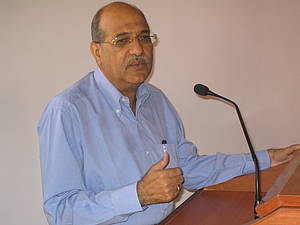
Wal-Mart is facing a new kind of opposition in India: a community-based mobilisation led by Muslim clerics
A dharna was organized by Ms. Sonia Raj Sood, noted advocate of the Supreme Court of India, to protest FDI in retail and particularly Wal-Mart on 7th February, 2007 at Jantar Mantar, Delhi. Various prominent Muslim clerics joined the dharna against Wal-Mart saying that they marked a serious threat to the existence of 15 crore poor of the community. Muslim leaders’ speeches betrayed an attempt to post the issue of FDI not just as economic model but representing a culture antithetical world view. A good number of participants were youngsters from madrassas (religious schools of muslims). US giant Wal-Mart’s bid to enter India through backdoor marks a real threat to the livelihood of small Muslim traders who account for quite a big share of the community’s population, the leaders said. Addressing the dharna, Mr. Anis Khan said 85% small retailers from Muslim community would be crushed if these retail giants were allowed entry. Mohammed Ibrahim called the community to unite against Wal-Mart. Shabbir Ahmed said if US companies were allowed entry, they will not only kill small retailers but also create social behaviour which leads to troubles. Rahimuddin Khan of All India Muslim Vikas Manch said that FDI in retail is going to hit the poor. Dharmendra Kumar, Campaign Organizer, India FDI Watch also addressed the dharna. Mr. Kumar briefed the protesters how Wal-Mart is proving a threat for communities and driving down working conditions. He further elaborated the high social and ethical cost of the low price being offered by them. Mr. Kumar also shared the achievements of the world-wide campaign against Wal-Mart and called the protesters to oppose the planned visit of Mike Duke, VC, Wal-Mart, to India to sign a deal with Bharti.
Trader’s Strike
1-24-2007
FDI Watch Campaign Director Reena Desai, was invited to speak by the Bangalore Fruit Merchants Association and Vegetable and Fruits Wholesale Merchants Association, two public meetings of vegetable and fruit traders. She was there to stand in solidarity with their strike and urge them to oppose any amendments to the Agricultural Produce Management Committee (APMC) Act, which governs the way produce is bought and sold. She spoke about the monopoly power that Wal-Mart has attained in the US in driving out thousands of small businesses, and what the affects will be in India.
On Wednesday, January 24th, traders across the state of Karnataka went on an indefinite strike against proposed amendments to the state APMC Act. Currently, all agriculture produce from farmers must go through the APMC market, which is regulated by the government and was set up in 1966 to protect farmers and traders. Traders along with APMC workers have not been consulted by the government and oppose any amendments, which will allow for contract farming and facilitate the entry of Multi-National Retailers into agriculture and retail trade.
Corporate retailers like Wal-Mart, Reliance and Metro have been the strongest lobbying force for amending the APMC Act. Currently because FDI in Retail is not opened, MNCs are allowed to operate under the Wholesale Cash-n-Carry Act, where they are only permitted to do wholesale, however any changes in the APMC Act, will grant them authorization to enter into retail trade and buy directly from farmers.
Reported by DH News Service Bangalore, “Terming the proposed amendments to the Act “unnecessary”, Mr Lahoti asserted that the government should discuss the proposed changes with the traders and farmers before effecting the amendment. “The government proposes the amendments only to welcome MNCs in the area. This will not only affect small traders, but also lead to more suicides among farmers”, he said.
UNI-ILC Organizing Workshop
1-20-2007![]()
From January 20-22nd Union Network International organized a three-day union organizing training of commerce sector workers, working in the retail and IT industries.
Workers from Metro were present in the workshop and are currently involved in a union organizing drive. Metro, a German based retailer, operates two stores in Bangalore with around 1,300 workers. Problems that Metro workers face include forced overtime without any payment, with some workers working up to 12 hours, denial of annual leaves and harassment on the job. Recently over eight workers were dismissed for unknown reasons and were present at the workshop.
UNI invited India FDI Watch to be present in the workshop and talk about our current efforts to hold Multi-National retailers accountable to their employees. Local campaign staff will work with local allies to build support and community solidarity with the workers efforts to organize.
Navdanya Workshop Report 13 January, 2007
Report on Three Days Course on
Limits to Globalization: Ecological, Social and Cultural
(13-15 January, 2007, Ramgarh, Dehradoon, Uttaranchal)
Faculty:
Mr. S.P. Shukla – Convenor, Indian Peoples Campaign
Dr. Vandana Shiva – Navdanya
Mr. Prashant Bhushan – Senior Supreme Court Advocate
Mr. V.P. Srivastava – Aazadi Bachao Aandolan
Eleven grass root leaders representing 7 non-governmental organizations participated in the workshop (detail list attached). There were all together 60 participants in the workshop. Leaders and activists particularly young activists from different organizations such as Aazadi Bachao Aandolan, Swaraj Vidyapeeth (Allahabad), Peoples’ News Network and Institute of Mass Communication (Prashant Vihar, Delhi) participated in the workshop. Along with these there were more than ten foreign delegates from different countries such as USA, Canada, France etc. in the workshop. These foreign participants were basically activist organic farmers.
The workshop on “Limits to Globalisation” explored the ecological limits, the democratic limits and the limits of justice that the project of globalisation is coming up against. It also covered the impacts of globalisation as well as alternatives that are emerging. The workshop aimed at the inter-linkages of the various issues concerning the common man. It discussed in detail the corporate entry into retail along with other burning issues such as Special Economic Zones.
Mr. S.P.Shukla started the first session with providing the background and context of the emergence of Globalization. He explained the powerful role being played by the speculative finance capital in the era of globalization and its unsustainability. Mr. Shukla further said that only consumption, little manufacturing, employment in speculative finance and criminal economy are some important features of the globalized society.
Vandana Shiva, in another session, talked of the impact of globalization on ecology. She asserted that Corporates’ are controlling lives through patent and destroying the bio-diversity. She explained various kind of pollution such as mechanical, chemical and genetic. She termed the commodification/privatization of natural resources as vital issue and claimed that rules of globalization are contradictory with the rules of nature. Ms. Shiva urged all present to fight for the dignity of hands and minds and move towards post-oil economy.
In the end, Mr. S.P. Shukla explained the emerging contradictions at global level. He also explained the contemporary crisis points and situations and put the issues of political agenda. In the context of building strategy for movement, Mr. Shukla emphasized on a wholestic strategy then to single issue politics.
The workshop discussed the Wal-Mart and its endangering impact on communities and particularly small retailers. We also discussed with Prashant Bhushan Ji the possibility of filing a Public Interest Litigation (PIL) on Wal-Mart-Bharti tie-up. We distributed our literature among the all present. We also managed to mobilize some of the participants to watch the documentary film ‘High Cost of Low Price’
It has definitely been learning and enriching experience for all of us. Most importantly, it helped us to share our works and thoughts and further strengthened our relationship.
CAIT Meeting 11-12 January 2007, New Delhi
Chief Minister Sheila Dikshit inaugurated the two days conference of the Confederation of All India Traders (CAIT). In her speech, Ms. Dikshit reiterated her government’s stand to save traders from the ongoing sealing drive as she believed that it is inhuman to disturb the livelihood of lakhs of people. Vijay Kumar Malhotra (Senior BJP leader), as a key speaker, called the traders to warn political parties on the issue of FDI in retail.
Around 300 traders participated in the inaugural session which was held in Hindi Bhawan, New Delhi. The rest of the sessions took place at its newly built office (including conference hall) in Karol Bagh, Delhi. Many prominent persons participated as key speakers on various issues. Some of them are Sri Jagdish Mukhi, opposition leader, Delhi Assembly, Sri Mangey Ram Garg, MLA, New Delhi, Dr. Narender Nath, MLA, New Delhi and Sri Sahib Singh Verma, Ex. Chief Minister, New Delhi. Around 50 trade leaders from 22 states of the country actively participated in the proceedings.
The first technical session was devoted to VAT and thereafter it was only the issue of Foreign Direct Investment in retail sector. We circulated our literature on Wal-Mart and campaign notes. We also received an article from Kamal Sharma (Centre for Policy Alternatives) which was duly circulated to the delegates. At the end of the two days conference the CAIT decided the following:
On nationwide campaign against corporate retail
- to build a national level policy to launch nationwide campaign from below
- to form district and state level committees to launch the campaign
- to organize state level conferences/seminars/workshops/demonstrations
- to campaign through emails and sms
- to send thousand of ‘Meghdoot’ postcards demanding No FDI in Retail to the President and Prime Minister of India
- to launch awareness program through handbill and posters (content & design to be send from the centre)
- to submit memorandum to MPs and MLAs
- Centre to send a CD for awareness program containing 15 articles in Hindi and English (to be translated in local languages) for publication in local press
- to mobilize popular religious commentators for advocacy against corporate shops
- to advocate among caste/creed based societies
Major All India action programs
- All India dharana on 24th January before the district collector and submit a memorandum to the President of India not to allow FDI in retail
- All India Rally of Traders against FDI in Retail (major participation from western Uttar Pradesh, Haryana and Rajasthan-date to be decided
November Rally Against FDI in Retail
Hundreds of hawkers, street vendors and social activists under the banner of India FDI Watch marched to parliament to warn the UPA government not to allow FDI in retail sector. The issue of FDI in Retail has gathered fresh momentum from small and marginal traders / trade bodies who have openly come out to protest against a recent statement by Kamal Nath indicating that foreign direct investment (FDI) norms in the retail sector may be further liberalized to enable greater flow of investment in the sector. The retailers fear that entry of foreign retail players in this sector is a direct attack on the livelihood of approximately 40 million people who are dependent upon retail trade. The deep pockets of the foreigner retailers would lead to their large scale displacement and unemployment, they fear.
Raising slogans against FDI in retail, Wal-Mart, Reliance and Bharati protestors marched from Jantar Mantar to the parliament. The march was addressed by Sardar Singh Kochar, General Secretary, Urban Street Vendors Redi Pattri Hawkers Federation, Vijay Singh, Leader, Hawkers Maulik Adhikar Suraksha Manch, Arjun Singh, General Secretary, Akhil Bharatiya Pawan Putra Indraprastha Redi Patri Theli, Dharmendra Kumar, Campaign Organizer, India FDI Watch, Rajesh Jaiswal, General Secretary, Harit Recyclers Association, Dineshwar Tiwari, Member, Governing Body, Janpahal, Ms. Hemlata, General Secretary, Asangathit Shramik Panchayat and Prem Bahukhandi, Centre for Advancement of Village Economy (CAVE).
Addressing the rally, India FDI Watch Campaign Organizer Dharmendra Kumar said, ‘Foreign and domestic retail giants like Wal-Mart and Reliance has developed a nexus with the UPA Govt. to open big malls. Mr. Kumar warned that it will lead to their monopoly on the retail sector of India and threaten the livelihood of 4.5 crores indian people employed in the retail sector. Mr. Kumar stated that multinational and domestic corporate interests are dictating the UPA govt.’s economic policy. He said, the worldwide anti-worker, anti-community practices of foreign retailers like Wal-Mart are examples for India not to allow FDI in Retail. He warned the Govt. not to play with the livelihood of the people.’
‘Local traders will not tolerate any injustice on this issue. I even fear that the ceiling drive in Delhi is a part of bigger game plan to pave the way for FDI in Retail. Kamal Nath’s statement to liberalize FDI norms is a supplement that has been perfectly matched with ceiling’ said Sardar Singh Kochar, General Secretary, Urban Street Vendors Redi Pattri Hawkers Federation.In his statement, Vijay Singh, leader of Hawkers Maulik Adhikar Suraksha Manch said ‘How can the government propose such a move when retail employs such a large number of people including a major chunk of uneducated masses who find it easy to open a kirana store and operate. They have not considered them at all’.
This protest march brought hawkers, street vendors and social activists to a common platform against FDI in retail. They also submitted a memorandum to the Prime Minister and Minister of Commerce on this issue.
Campaign Update – The India Social Forum
![]() The India FDI Watch campaign got a boost at the India Social Forum, held in Delhi from November 9-13. The Social Forum was attended by about 60,000 people from all across India representing a wide range of issues, struggles and movements organizing for social justice and putting forth alternatives to corporate-led globalization.
The India FDI Watch campaign got a boost at the India Social Forum, held in Delhi from November 9-13. The Social Forum was attended by about 60,000 people from all across India representing a wide range of issues, struggles and movements organizing for social justice and putting forth alternatives to corporate-led globalization.
The India FDI Watch Campaign organized a very successful event within this context and brought together leaders from different mass-based constituency groups to stand together and oppose the opening of FDI in Retail and the general rise of corporate retail and corporate backed government policies that are facilitating the entry and growth of giant retail chains. A broad alliance for “Retail Democracy” was announced. Under the title “FDI, Special Economic Zones, and the Corporate Hijacking of Retail; Impact on the Agriculture and Retail Sectors,” a wide range of issues were discussed and the linkages between them all leading to the same place; the growth of corporations at the expense of the public good with Wal-Mart leading the race to the bottom
We had an array of speakers and sponsors who had become our partners and allies in the campaign because they potentially stood to lose millions of jobs from the growth of corporate retail. The panel was a collection of heavyweights, the leadoff was Vandana Shiva of Navdanya, who spoke about the importance of protecting indigenous agriculture and livelihoods that are threatened by the Wal-Mart onslaught and increased corporatization of retail food supply and distribution. She also spoke about Reliance, India’s largest corporation that has taken Wal-Mart’s lead and entered the retail industry with ambitious plans to open 4,000 outlets in three years. Reliance is responsible for buying huge tracts of land, sanctioned by the state, known as Special Economic Zones for which thousands of farmers have been uprooted and all tax and labor laws exempt.
The Confederation of All India Traders (CAIT) General Secretary, Praveen Khandelwal, was scheduled to speak, but was still in jail for protesting the sealing of shops by the Delhi Municipal Corporations. The issue was not unrelated to the building of malls, and there was a general feeling of irony that the small shops were being sealed while huge plots of land were going to build malls and retail outlets. This issue was also taken up by Saktiman Ghosh, president of the National Hawkers Federation based in Kolkata which was there in full strength with its delegation. So was Sodan Singh, the leader of the National Alliance of Street Vendors of India (NASVI). The Harit Recylers Association (HRA) on the downstream side of the distribution channel was also there and its leaders led some of the most exciting and rousing chants heard in years. The chants were synchronized so that on the beat the arms shot up in a fist from the crowd.
As additional weight to the program we had Member of Parliament Sri Abani Roy speak who shared with the crowd and later with the press about the letter from Congressman George Miller warning of the abuses of Wal-Mart in the USA. From the labor movement one of the leaders of the Center of Indian Trade Unions (CITU) spoke about the impact on labor in the broadest terms. Also, Medha Patkar of the Narmada Bachao Andolan and NAPM came in to help link the impact to the fight against seizing agricultural land and the creation of displacement with the overall development course the state is taking and backed by corporate interests.
Wade Rathke, ACORN Chief Organizer, ended the panel with the experience that ACORN, WARN and the WWA have had in the United States in stopping the growth of Wal-Mart and big-box retailers. As it becomes clearer that corporate retail chains will stop at nothing to enter the Indian market, Rathke’s experience and suggestions were timely. Communities and mass-based constituency groups must come together to stop the growth of big-box retail chains by developing policies and legislations that make sense in the local and national context. Many found it surprising that Wal-Mart has been successfully kept out of major US cities like Los Angeles and New York, yet will plan to build, along with all other retailers, in major Indian cities.
Vinod Shetty, a campaign leader based in Mumbai and a known and respected activist and lawyer, had drawn the straw as moderator from the India FDI Watch campaign.
No FDI in Retail Campaign August and September 2006 Update
September 2006
The last two months have strengthened the India FDI Watch campaign with large number of invitations from the political parties for our inputs on FDI in retail to their cadres. These two months also saw building of rapport with youth through small group meetings and seminars at different institutional premises.
On 2 September 2006, the state BJP unit had invited Campaign Organizer Reena Desai to deliver a lecture on FDI in retail for the cadres. Senior state BJP leaders, including Shri Vinod Pandey, Kisan Morcha and the State unit leaders have been organising street meetings and holding brain-storming sessions with party functionaries to ensure that the BJP has a strong message on FDI in Parliament. Our presentation to their party cadres was well-received. On 3 September 2006, another such meeting was organised by the Delhi BJP’s Sadar district unit where Mr. Khurana and Mr. Garg exhorted party workers to go to the people and highlight the `misrule’ of the UPA Government. We were asked to give a brief lecture on the impact of FDI in the retail sector. Again on 9 September 2006, we were asked to deliver a lecture on the impact of FDI in retail to the BJP student leaders. Through all these meetings we have developed a fairly good rapport with the state BJP unit.
We had participated in a Traders rally organized by the traders’ wing of the BJP. Markets across Delhi were closed on Wednesday (6 September 2006) as traders downed shutters to protest against the ongoing sealing and demolition drive by the MCD and on the opening up of retail sector to foreign companies. This was in response to a bandh called in the capital by the Confederation of All India Traders (CAIT). All the markets in the capital were closed including the busy Chowri Bazaar, Connaught Place, Greater Kailash, South Extension, Lajpat Nagar and Green Park. The rally began from the State unit of the BJP and passed on through the Connaught Place, India Gate, Rashtrapathi Bhavan and ended in the Parliament. Shiromani Akali Dal and Swadeshi Jagran Manch have also announced their support to the traders rally. Traders in small groups have demonstrated at various places across the national capital against the sealing drive and retail issue.
During the last two months, we have met 11 MPs across major political parties. This includes: Shri. Ananth Kumar (BJP), Shri. Vijay Malhotra(BJP), Shri Ravi Shankar Prasad(BJP), Dr. Gyan Prakash Pilania(BJP), Shri Surendra Motilal Patel(BJP), Shri Kanjibhai Maganbhai Patel(BJP), Shri Rudra Narayan Pany(BJP), Shri B. J.Panda (BJP), Shri Saman Pathak (CPI M), Shri Syed Azeez Pasha, (CPI), Abani Roy (RSP). We were successful in lobbying with Shri. Abani Roy, the veteran Parliamentarian, to write a letter to a US Senator on seeking support for stopping entry of Wal-Mart in India.
No FDI in Retail July Campaign Update
![]()
Along with the traders, representatives from the National Hawkers Federation, the National Alliance of Peoples’ Movements and the All India Kisan Sabha (Farmer’s Union) attended the meeting. The Campaign was instrumental in bringing these different constituent organizations to the Traders’ meeting and will continue to be instrumental in building these strategic alliances. As Praveen Khandalwal, CAIT General Secretary, pointed out at the close of the meeting; we must have a broad-based movement to oppose FDI in Retail and will work towards expanding the Traders Coordinating Committee into a broad-based national coordination committee in the coming months.
____________________________________________________
A national level meeting of Farmer’s groups and unions was held the following weekend from July 28th-29th.
The India FDI Watch Campaign partnered with Dr. Vandana Shiva, Director of Navdanya and the Research Foundation for Science, Technology and Ecology, for a session, “Wal-Mart, Reliance & the Corporate Hijack of Retail”. Over 200 farmers groups and leaders from across India attended the meeting. With a brief introduction by Dr. Vandana Shiva, Campaign Organizer, Reena Desai opened the session with an overview of the Campaign and of Wal-Mart and the devastation the company has caused in the United States and around the world. Participants listened intently to the harmful impact that Wal-Mart’s business model has caused to millions of US citizens and people around the world. Short clips of the film “The High Cost of Low Price” were shown. The farmers’ groups were particularly interested in the fact that organized campaigns against Wal-Mart have started in the US and were grateful for the vision and initiative of the India FDI Watch Campaign in bringing lessons learned and spreading awareness in India.
Dr. Shiva also spoke about the future retail plan of Reliance Industries, and Indian industry house that has recently announced a $6 billion investment in retail with plans to open 10,000 retail outlets across India. It has also been recently reported, that Wal-mart is talking with Reliance Industries about a possible partnership. She touched specifically on the current land grab that is taking place all across India where Reliance Industries and other large real estate developers are being given enormous pieces of land by the federal and state governments virtually for free. These plots of land, known as Special Economic Zones (SEZs) are also speculated to be the sites where Multi-National retailers intend to build their stores.
Similar, to the traders meeting held the week before, the session concluded with gratitude from the farmers for a new-found awareness and sense of urgency in opposing Wal-Mart and other organized retailers. Plans were discussed for future mobilization of the farmers’ groups in targeted places where SEZs are.
The same day as the Farmer’s Meeting, another meeting was being held in Mulund, a Mumbai suburb, where shopkeepers have experienced 10-40% drop in business due to South African Mega Retailer, Shop Rite. Over 150 local retailers attended the meeting, which was organized by the Shopkeepers Welfare Association under the leadership of President, Yogesh D. Katira.
In the context of the traders’ experience with Shop Rite, the purpose of the meeting was to bring affected and concerned shopkeepers together to both tell their stories and hear from representatives of India FDI Watch and the Federation of Associations of Maharastra and Swadeshi Jagran Manch. Reena Desai, Campaign Organizer and Advocate Vinod Shetty, local Campaign leader, informed the shopkeepers of the various initiatives and movement underway within different constituencies to oppose FDI in Retail and assured the shopkeepers of a broad base of support in this struggle. Reena spoke specifically about the US small business experience due to Wal-Mart and the importance of immediate action to forestall a similar experience in India.
Mohan Gurnani, President of FAM and recently elected convener to the National Traders Coordinating Committee, spoke about FAM’s six-year lobbying campaign, which was successful in delaying the opening of FDI policy. But given the current reality and the reported advance of Wal-Mart & Co., he gave a passionate speech about the immediate need for action and a grassroots movement to oppose FDI in Retail.
The meeting ended with discussion on future actions, and holding similar meetings in Mumbai proper and in other surrounding suburbs. Shopkeepers and Trade Association leaders from the neighboring suburbs of Chembur and Bhandup attended the meeting and planned for future meetings. Posters, developed by the campaign, were also distributed to the shopkeepers to post in their stores.
Key markets in New Delhi shut down on 01 March 2006, following a strike call by Trader Associations against the Government’s decision to allow 51% FDI in single brand retailing and the recent demolition of thousands of small shops by the Delhi Government. Thousands of traders across Delhi joined in the agitation and key markets in Karol Bagh, Sadar Bazar, Chandni Chowk and Kashmiri Gate were deserted. The strike was endorsed by Trade Unions, Trade Associations and several major left and right political parties including CPI, CPI-M and BJP.
“We realized that nothing was really being done and we were just unnecessarily losing time. We have reliable information that the bill on FDI is coming up in the Parliament soon, and we had to do something.” said Praveen Khanelwal of the Confederation of All India Traders Association. The traders were demanding that the Central Government reverse the recent decision to allow 51% FDI in single brand retail trade. A move that many believe is just the first step to opening up FDI in Retail fully and thus allowing Wal-Mart to stomp all over the country with the highest small retail shops per capita. The Strike was deemed a success by the great amount of participation and press! Watch out Wal-Mart, bullying your way into India may not be as easy as you anticipated!
Creating a No FDI in Retail Coalition
In Delhi, the India FDI Watch team met with an array of politicians, traders and social activists, all sharing the common view that multi-national retailers must not be allowed to enter India. Two senior BJP leaders, Shushma Swaraj and Dr. Murli Manohar Joshi, voiced their opposition to changes in FDI policy and expressed their solidarity with small traders, their major constituency. Both Ms. Swaraj and Dr. Joshi assured to raise this issue in Parliament. At the same time, The Confederation of All India Traders (CAIT), a nation-wide traders organization, announced a two-day conference to form a national coordinating committee. As Praveen Khandalwal stated, the purpose of the committee would be to “to finalise a strategy to launch a national movement against FDI”.
Additionally, MP Abani Roy and General Secretary, G. Devarajan, of the Revolutionary Socialist Party and All India Forward Bloc, respectively, reemphasized their continuing opposition to foreign direct investment in retail. Both stressed the importance of a broad-based coalition and unity among the Left parties in opposing changes in FDI policy.
The Delhi meetings were wrapped up with Ms. Vandana Shiva, an internationally known environmental activist and director of The Research Foundation for Science, Technology and Ecology. Through her work, Vandana Shiva has been raising awareness about Monsanto and Wal-Mart and fully understands the deleterious implications that FDI in Retail would have on India’s agricultural sector. To this end, she committed to work along with the campaign and take a leading role to incorporate farmers groups in this struggle.
